RYA Yachtmaster Offshore. How to pass the practical exam.

- 5th September 2022
- by Pete Green

How to pass the RYA Yachtmaster Offshore practical sailing exam: Here are our top tips!

Why take the RYA Yachtmaster Exam?
Several organisations around the world offer professional sailing qualifications. One of the most renowned, and the oldest, is the Royal Yachting Association Yachtmaster Offshore qualification. This recognises that the holder is competent to skipper a sailing yacht on a passage 150 miles from a safe haven. There are plenty of excellent and accomplished sailors on the oceans who do not wish to acquire ‘tickets’, but many boaters do sign up for exams each year, so why bother? Courses can teach you the core skills that a modern sailor should have at their fingertips. Sailing with people from diverse backgrounds and with knowledge of different cruising areas helps you realise where the gaps in your own knowledge are and can inspire you to learn new ways of tackling fundamental skills. Most yachting establishments require their employees to have a recognised professional qualification. Without one, sailors will find it difficult to gain work as an instructor, yacht delivery skipper or find employment on a charter vessel.

RYA Yachtmaster Offshore Practical Exam and pre-course requirements.
The practical exam usually takes 8-12 hours for one candidate and 4-9 hours per candidate where more than one person is being examined. Sailors can be asked questions about any part of the RYA syllabus including areas such as: boat handling, navigation, man overboard, safety, meteorology, adverse weather conditions, long passages, and general boat husbandry. There are also pre-exam requirements. A candidate must hold a Radio Operators Certificate and a valid and acceptable First Aid qualification.
Potential Yachtmasters must have spent a minimum of 50 days at sea with 2,500 miles in their logbooks, including at least five passages over sixty miles. Two of these should have been as skipper and two completed with night passages. Half the sea time must be in tidal waters in a vessel less than 24m. Several sailing schools around the UK offer to arrange exams and assessors; often there is an option to spend a prep week beforehand on the vessel that will be used in the exam.

Halcyon Yachts Top Tips for a successful RYA Yachtmaster exam:
Some sailors breeze through the exam, enjoying the experience and remaining calm and confident throughout. Most people though find the whole thing nerve-wracking and uncomfortable. So, what can you do to make the experience a positive one, how best to prepare and how should you present yourself to the best advantage? We asked some leading Yachtmaster Instructors and Assessors for their top tips: here are our favourites.
- “Practise sailing onto moorings at every opportunity as this makes you more confident for MOB under sail and sailing onto the anchor. Remember, the examiner wants you to pass, it is an opportunity to show off.”
- “Remain calm and focused, things go wrong during exams, they are long, and something is bound to go less than perfectly. It is often one small mistake that that becomes a small incident that becomes a major error that a candidate cannot recover from that leads to a sailor having to retake their exam.”
- “Know your weather and collision regulations. A candidate’s knowledge of Colregs instantly tells an examiner if the candidate is serious or not. It is an element that can be learnt long before the exam, there is no excuse not to know them. I tell my students knowing them can be a big ‘get out of jail free’ card during the exam if things are not going well.”
- “Give your crew clear, concise instructions using sailing language, practise ‘command and control.’ Tell your crew members what you would like them to do, give them time and space to do it, and then respectfully check they have completed the task.” There is no point in rushing the crew and adding stress to the exam, there is nothing wrong with taking a little time and having some finesse to your manoeuvre.”
- “Teamwork: collaborating with your crew to make sure you are all in best form and working towards a common goal, if you help the other candidates, they will help you when it is your turn to be the skipper. An examiner will soon spot a candidate who is trying to make himself or herself look better to the detriment of other sailors.”
- “Show the examiner that you care about the boat, coil down properly, close locker lids gently, show good seamanship and boat husbandry skills. Set lines and fenders correctly and efficiently, move around the boat with quiet confidence and authority.”
- “Do not try and make excuses or blag your way out of bad situations, your examiner will see straight through you. Be honest, if you make a mistake, admit it, and ask for another opportunity to complete a task.”
- “Sailing for the exam is not a race, it is not looking at how fast you can go, how hard you can push the boat to its limits. It is a cruise, a slow gentle sail to show you can be safe and in control. Put a reef in a little bit before you would normally, keep the boat flat, comfortable, and stable.”
- “Take your time, The YM exam is a snapshot of what you can do. It is a small window into your sailing life. There is no rush to do anything, it is better to do it once and controlled than to do it several times hurried.”
- “A good skipper does not spend ages down below ‘over navigating.’ Have your passage plan prepared, know where you are and where you are going, and become familiar with the navigation equipment on board. You then have plenty of time to run the yacht proficiently and look after the crew. The only time you should be down below constantly navigating is during the ‘Blind Nav’ assessment. Prepare for and master this tricky task”!
- “Practise entering and leaving unfamiliar harbours using charts, pilot books and almanacs. Become familiar with interpreting 2D images on a page into the 3D reality on the water. Do this at night as well when there are lights flashing all around you and you must pick out marks against harbour lights.”
- “The sanity check, this is my favourite thing to do, it is the checking over your task to make sure you have covered every base and have not missed anything out. It is the equivalent of the pilot’s check list.”
- “Know your skills, make sure that you have had lots of practice before going into a prep week and get your theory up to scratch. It is not something that a candidate should take lightly, and you need to make sure you are comfortable in your own skin doing the skills. Do not think the prep week will give you the skills you need to do the exam. It is a polishing week, designed to just finesse your abilities and plug the little holes in your base knowledge.”
- “Paperwork! Make sure you have all the appropriate paperwork neatly packed up and ready to hand to your examiner. It is not the training centres job to make sure you have done the correct eligibility tasks; it is purely yours. Ensure you have all the necessary certificates with you and that your logbook is relevant and current.”
- “Remember that the examiner is also a very experienced instructor. They love to teach. The RYA Yachtmaster exam is another valuable opportunity to learn from a very knowledgeable skipper. If you embrace this opportunity with a positive attitude then they will likely turn what you perceive as a mistake into a learning opportunity. The best skippers never stop learning!”

Many thanks to those who helped with this article.
Phil Somerville, author of “The Practical Guide to Celestial Navigation” – buy your copy here: https://www.amazon.co.uk/Practical-Guide-Celestial-Navigation-Step/dp/1472987586
Mark Treacher, Yacht Delivery Skipper and RYA Sailing Instructor.
Mike Sharland, RYA Yachtmaster Instructor at “Scot Sail”. https://www.scotsail.co.uk/
Tomos Price, Chief Instructor and co-owner of “Commodore Yachting”. https://www.commodore-yachting.com/
Pete Green, Yachtmaster Instructor and Managing Director at “Halcyon Yachts”. https://halcyonyachts.com/
Fantastic read and top tips!… look forward to sailing with you again soon I hope!
The Boy Scouts motto ‘Be Prepared’ is a valuable one when considering the YM, think ahead.
Add Comment Cancel reply
Your email address will not be published. Required fields are marked *
Save my name, email, and website in this browser for the next time I comment.

- Recent Deliveries
- Yacht Delivery
- Halcyon News
- Halcyon Blogs
- Halcyon Videos
- [email protected]
- +44 7966 537992 +44 1872 858052
- skype:halcyon.yachts?add
- 42 Woodland Ave, Penryn, Cornwall, TR10 8PG.

RYA Yachtmaster Coastal / Yachtmaster Offshore Prep & Exam
Preparation course overview.
The RYA Yachtmaster Coastal / Yachtmaster Offshore Preparation course enables those who hold the required prerequisite experience to sit the RYA Yachtmaster Coastal or RYA Yachtmaster Offshore exam to fine tune their existing skills prior to sitting the practical exam.
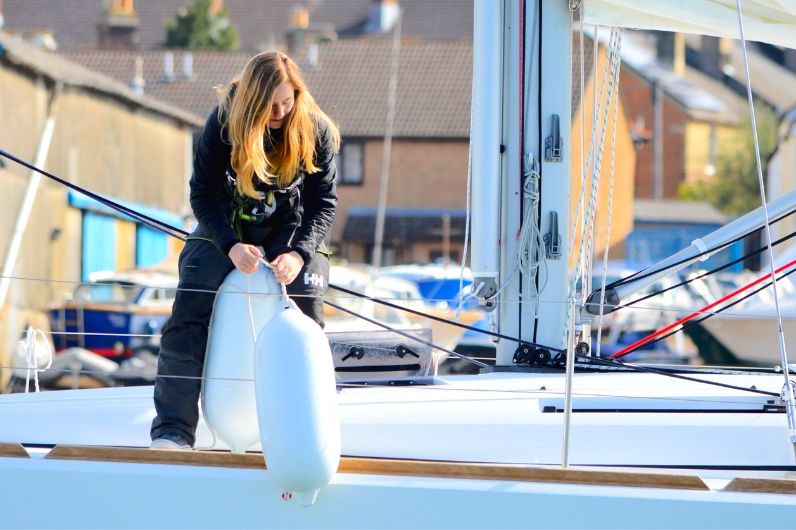
About the course
The preparation course is run over 5 days and designed to assess your level of competency against the RYA Yachtmaster Coastal or RYA Yachtmaster Offshore exam syllabus found in the RYA Yachtmaster Scheme Syllabus and Logbook (G158/15) and is intended to fine tune your existing skills and polish any areas of weakness prior to the exam. The subsequent exam is then run over two days, following the preparation course.
Prior the prep course, we advise that you read the exam syllabus and give yourself an honest appraisal of your strengths and weaknesses. Try to address any shortfalls beforehand and then during the preparation course be open with your instructor about your abilities and what you need to work on in the run up to your exam.
During the prep course your instructor will frequently update you on your progress and ability and recommend which exam you should aim for – whether Coastal or Offshore.
The syllabus is taught in a ratio of (4:1) students to instructor.
Prerequisites
Rya yachtmaster coastal exam (sail).
Candidates must be aged 17 or over and require;
- A Radio Operators Qualification – A GMDSS Short Range Certificate (SRC) or higher grade of marine radio certificate
- A valid first aid certificate
- Seatime – 800 miles logged within 10 years prior to examination, 30 days living on board, two days as skipper and 12 night hours.
For holders of the RYA Coastal Skipper Practical course completion certificate, the seatime requirement is reduced to 400 miles, 2 days living on board, 12 night hours, two days as skipper.
Half of the qualifying seatime must have been gained in tidal waters. For sizes of vessel please refer to page 73 in the RYA Yachtmaster Scheme Syllabus and Logbook (G158/15).
RYA Yachtmaster Offshore Exam (Sail)
Candidates must be aged 18 or over and require;
- Seatime – 50 days, 2,500 miles, including at least five passages over 60 miles, acting as skipper for at least two of these passages and including two which have involved overnight passages. Five days’ experience as skipper.
At least half of the qualifying seatime must have been accrued in tidal waters. For sizes of vessel please refer to page 73 in the RYA Yachtmaster Scheme Syllabus and Logbook (G158/15).
Full details and definitions on qualifying passages can be found here .
Exam overviews
The exam will include an assessment of your skippering skills, boat handling, general seamanship, navigation, safety awareness and knowledge of the IRPCS (collision regulations), meteorology and signals. You will be set tasks to demonstrate your ability and may also be asked questions on any part of the syllabus for all practical and shorebased courses up to Yachtmaster Coastal level.
The exam will include an assessment of your skippering skills, boat handling, general seamanship, navigation, safety awareness and knowledge of the IRPCS, meteorology and signals, with particular emphasis on command skills, boat handling under sail and power in confined spaces, plus navigation and pilotage techniques in daylight, at night and in reduced visibility. Adverse weather conditions and coping with emergencies are also covered.
The examiner will set tasks to enable you to demonstrate your ability as skipper and may also ask questions on any part of the syllabus for all practical and shorebased courses up to RYA Yachtmaster Offshore.
Exam Duration
The exam will take around 8-12 hours per candidate candidate. No more than two candidates can be examined in 24 hours. Whilst one candidate is being examined the remaining candidates will act as crew.
Qualifications
RYA Yachtmaster Coastal Certification of Competence.
RYA Yachtmaster Offshore Certificate of Competence.
Dates and pricing
Register your interest.
- First name *
- Last name *
- How did you hear about UKSA? * –None– Cowes Harbour Handbook Event Facebook General Knowledge Google Ads Instagram Outdoor collateral Press Referral RYA Dinghy Show School trip Solent Handbook & Directory Southampton Boat Show The British Boat Owners Directory Website
- General notes
- Opt-in to receive course information and relevant offers
- Accept Privacy Policy and Terms and Conditions .
- Name This field is for validation purposes and should be left unchanged.
You may also be interested in
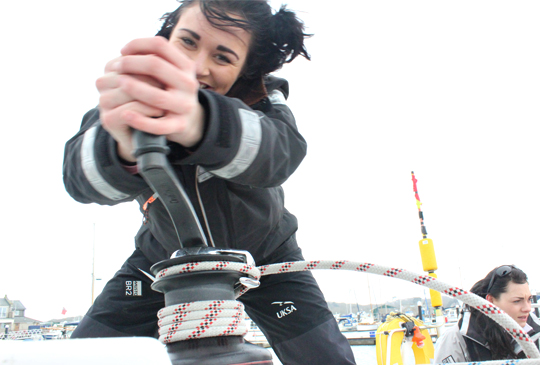
Need help finding the right course for you?
Speak to an advisor on +44 (0)1983 203001 or email us

How to become a yachtmaster
Practice on the boat you will do your exam on, go straight from practice to exam, know your crew and stick with them, practice in the area you will take the exam, prepare to make mistakes, they will happen, area that examiners like to ask about.....

So you’ve decided to go for it, you’re going to become a Yachtmaster , brilliant! Now there’s one pesky thing standing in your way, the all important exam.
Yacht master exams are physically and mentally gruelling. There are few tests in the world that require you to live with your examiner in a confined space whilst being asked to do things (or have fictional problems occur) from the moment you step onboard to the moment you park up a few days later.
What’s the key to passing your exam? Well the answer is simple, preparation. Let’s assume you’ve gotten all the miles you need, you’ve done your theory test and, for now, we are talking about your practical, on water, exam.
Here we share with you our guide to being totally prepared for your Yacht master practical exam, tips that have come from current Yachtmaster’s who have been through what you’re about to go through, who’ve made mistakes, got it right and got it totally wrong. Learn from their successes and mistakes and you’ll arrive on exam day feeling confident and ready to rock it. Here we go.

Every boat handles differently so it’s essential you practice onboard the boat with which you plan to do your exam.
Some boats may have a lot of WALK when in reverse or quirks when starting the engine, different power management systems and a host of other unique “characteristics”. Whatever these oddities are it’s better that you know them going into your exam rather than working them out with your examiner breathing over your shoulder.
What is her draft, how much water does she hold, where are the seacocks, where are the fire extinguishers , what is her Air Draft? It is a good idea to go through the yacht with a fine tooth comb (as you would on any new boat) and make up a yacht specific information sheet. Generally it is a good idea to post this sheet somewhere in the Nav Station. This sheet should have all the relevant data about the yacht. If you get asked where the sea cock for the engine is, or can you parallel the house and engine start batteries in an emergency, it wont look good if you don’t know.
The best, most complete sailing app available. Cuts out the need to use lots of different apps. Incredibly easy to use. Modern navigational planning software as it should be. Not just a picture of a chart!!!
Keith Binley
If possible it’s advisable to do a minimum of two days to a week of Yachtmaster practice on the boat you are doing your exam on. Finish those training days by going straight to pick up your examiner. After a few days to a week of parking practice, manoeuvres, man overboards, blind nav, pretend engine failures and so on you will feel well into your rhythm when your examiner decides to throw one of these at you.

During your exam your crew can really make or break your results. Get a slick crew that you know and trust and your experience is much more likely to go smoothly, in fact if you make a mistake they may just save the day for you. Nothing is worse than trying to do a manoeuvre with a crew you barely know only to find they don’t know your hand signals or how you like to get things done, there’s a communication breakdown and the crew starts shouting and looks a mess.
Know your crew, teach them how you like to sail, instruct them on YOUR procedures for each manoeuvre and you should set yourself up nicely to have a slick, quiet, professional looking crew.
Whether you’re sailing in tidal waters or not, knowing the area is essential to making your Yachtmaster exam as stress free as possible. If you need to work out a passage plan, but have already done that route many times before, the process will be a lot easier. In addition you are more likely to be aware of local navigational hazards, local regulations (and so on) than if you were new to the area.
What will the weather and tides be doing over your exam period? With modern forecasting you should build up a picture of what the expected conditions will be like utilising multiple sources and be able to talk about the forecast with your examiner.
savvy navvy has a built in sailing weather forecast , as well as detailed marine navigation maps that might come in handy at this point!
We’re sorry to say it but you are not superhuman, so don’t fool yourself into thinking you or your crew won’t make mistakes. In fact you should plan for them.
Before your exam, make a big list of every possible mistake that could go wrong. From losing a fender overboard to MOB’s and engines cutting out as you come in for a park, you need to physically and mentally prepare for every eventuality. You could even go one step further and ask your crew to invent imaginary problems and throw them at you to see how you cope!
As a competent skipper you should ALWAYS be thinking what if…. During your exam always think in the back of your mind - if THIS happens NOW I will do THIS. That way when your examiner throws a curveball at you, or you and your crew mess up for real, you can calmly react to it like a pro.
A Yachtmaster exam is NOT a sailing exam . An examiner is not going to expect grand prix levels of sail trim. Don't get us wrong you need to be able to sail in order to pass it (this is almost a given). A yachtmaster exam is an exam on your ability to manage a crew safely (being a skipper) and navigating safely.
Remember your examiner is not only assessing you for how you sail on a good day, to be a Yachtmaster they are assessing how you cope when things don’t go to plan. You need to show that you can keep calm and be professional and safe when problems occur and if you’ve practiced beforehand you will be more likely to come across as an authoritative and capable skipper who’s in control. Talking of control, do you know what a broach is in sailing ?

Unfortunately most RNLI call outs are due to engine failure. As a result you are highly likely to get asked about the engine. You WILL need to know the engine well. Do you know your checks (IWOBBLEDU)? Make, model, horse power, fuel consumption, sail drive or shaft, fuel shut off, raw water intake/ strainer, coolant level, engine oil, gearbox oil, impeller, belts, battery isolator, emergency parallel? Do you know where all of these are and can you identify them?
If the engine does stop, what do you do? Fault find, but remember you have many options including navigating and sailing to safe water or going to anchor!
You will be asked to show you are competent with a plotter and a RADAR , specifically the set on board. Make sure that you are. When was the last time you used a plotting sheet?
Meteorology
It is not enough to have the sailing weather forecast anymore. You need to demonstrate that you have a detailed understanding of weather principals and understand the limitations of various sources of weather information.
Know your Pilotage
This is good advice not just for the exam but for sailing in general. The truth is, surprisingly enough, that most groundings happen close to ports due to problems with pilotage. Make sure your pilotage is rock solid. Clearing bearings, minimum depths, use multiple sources to back up your position don’t just rely on a plotter or one source. You can use savvy navvy as a sailing route planner and double check marine weather , tidal information, depths and a multitude of other sailing navigation tools we’ve built into it.
If possible visit ports you are likely to encounter before the exam. Ideally in daylight and at night. If you can’t do that then there is still no harm in making a plan for entry and exit as part of your preparation.
Going out for a sail?
Start planning your next trip with our sailing navigation app savvy navvy . Compare our marine navigation GPS app with Navionics Free here.
savvy navvy , the boating app that brings all essential marine information together in one place. Featuring global charts, wind and weather forecasts, tidal graphs, GPS Tracking, automatic weather routing, and marina and anchorage information. It’s like Google Maps for boats.
Inspired to get on the water? Start your free trial today.
Latest Articles.
7-day greece cruising itinerary.
Imagine crystal blue waters with so much depth you can drop anchor right off the shoreline, calm flat waters that are almost mirror-like in reflection and Instagram-perfect flamingo floating sceneries. You would be forgiven for thinking I’m talking
How to Read A Nautical Chart Depth? A Step-by-Step Guide
Reading the depth on a nautical chart depth can be challenging for a beginner boater. However, with a step-by-step guide, it can be easy to get to grips with.
How to Calculate Nautical Miles On A Chart? All You Need to Know
Distances at sea are measured in nautical miles which are different to land miles. To measure distance on nautical charts, you will need a nautical ruler or dividers, which are specifically designed for use with charts. Calculating nautical miles on
Yachting Monthly
- Digital edition

How to pass your Yachtmaster exam
- Chris Beeson
- September 16, 2015
The global standard of sailing qualifications is achievable for any experienced, competent skipper. Tom Cunliffe explains how to pass your Yachtmaster exam
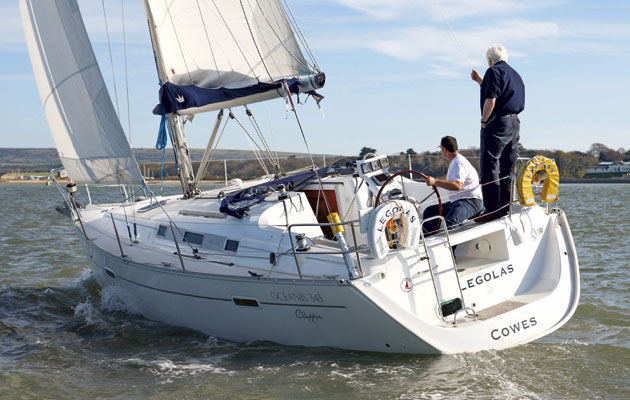
The only certificates accepted by the authorities are those issued after an at-sea examination. To become a fully-fledged Yachtmaster, the practical test is the only one that counts Credit: Graham Snook/YM

Tom Cunliffe is an RYA Yachtmaster examiner. He has passed and failed hundreds of Yachtmaster candidates over the years
We in the UK are exceedingly fortunate. Just as the English language is the best bet for a world traveller, our very own RYA/MCA Yachtmaster qualification happens to be the global standard for sailing. It’s required for anyone planning to become a professional and, thanks to the continuing efforts of the RYA, Brits who sail for leisure still don’t have to carry any proof of competence in home waters. Despite this blessed lack of regulation, the Yachtmaster certificate remains the logical target of many a self-motivated sailor. It also represents the icing on the cake for those looking for the reassurance of an external assessment.
Courses and exams
Yachtmaster training can take place on a boat or in a classroom. A shore-based course, either at desks in a school or via the increasingly popular Internet distance learning programmes, ends with a Yachtmaster theory exam. Success in this will help a student in subsequent qualification upgrades, but it is not officially recognised. The only certificates accepted by the authorities are those issued after an at-sea examination – the Yachtmaster Practical . To become a fully-fledged Yachtmaster, this practical test is the one that really counts.
Yachtmaster Prep

Meteorology matters: a favourite with examiners is to produce a weather map and invite you to analyse it. Be ready and know your subject
This is a non-RYA course and, as such, has no official status or syllabus. However, it is run successfully by many RYA sailing schools to prepare candidates for an examination which generally follows on at the end. Up to four students spend several days together on the boat in which they will be examined. The benefits are that they get to know one another and their yacht under the guidance of a highly qualified Yachtmaster Instructor. The general feeling is that these tutors can’t teach you much you don’t already know in a week, but that they are very good at coaching the best out of those skills you already have. Prep courses are great for brushing up on how to jump through the various hoops an examiner may set up. What they can’t do is make someone who doesn’t have suitably constructive mileage into the confident skipper examiners are looking for.
Coastal or Offshore – what’s my level?
Recently, the old Coastal Skipper ticket has been superseded by the new ‘Yachtmaster Coastal’ certificate. The qualifying mileage for this MCA-recognised qualification is 800, with passage and night-hour requirements being relaxed in comparison with ‘Yachtmaster Offshore’, which keeps its 2,500-mile entry level. Either is a proper Yachtmaster qualification and can be described as such. Only the often-dropped suffix distinguishes the two. The syllabi are identical, the variant is the rigour of the examination. Apply for ‘coastal’ and the examiner, recognising that you have less sea-time, will be more inclined to cut you a bit of slack.
The RYA has noted that most candidates are really only making ‘coastal-status’ passages. In real terms, this includes an annual trip across the Irish Sea, the North Sea or the Channel in a calculated weather window, which is very different from setting off from Ramsgate towards Norway with five days and potentially serious conditions ahead of you. The implications should be clear: unless you need the Offshore ticket for professional reasons, if in doubt, go for Coastal.
Preparing yourself and the boat
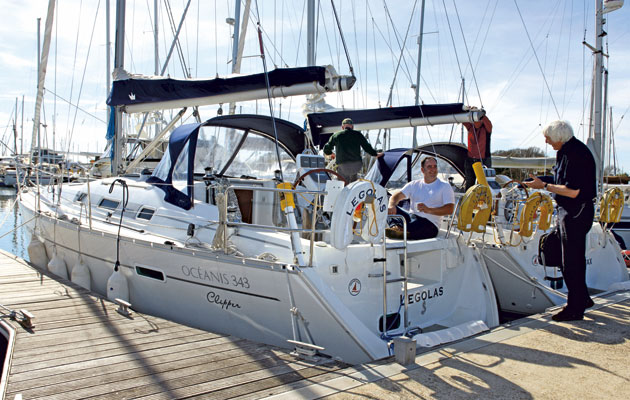
A relaxed candidate with a mug of tea makes a better impression than a harassed-looking one
If you’ve signed on with a sailing school, you’ll be stuck with the boat you’re given. You can be confident that this yacht ticks all the official boxes by being coded for commercial use, but while some are very up-together, others are not. If the boat is generally sloppy and scruffy, you can at least make an effort to stow the mainsheet in a seamanlike manner while you are nominally skipper.

Neatly coiled lines reflect well on the skipper
You can also ensure that fenders are hung at the same level, sharpen up the guardrails and see that things generally look as though somebody knows the difference and cares. Then the examiner won’t hold the ratty lifebuoys and the smelly bilge against you.

Mind that your dress and demeanour don’t make a bad first impression
Try to be ready in good time so that you aren’t involved in a last-minute kerfuffle. If you’re relaxing in the cockpit with a mug of tea when the examiner arrives, he or she will be more impressed than if you’re frantically working out tidal heights and scuffling through the chart table. Wear sensible kit. Don’t worry if it’s not this season’s fashion. My examiner turned up in an old duffel coat back in 1978 and I think I was wearing a canvas smock and a flat cap, but the smock was freshly laundered and the cap was right way round…
The main thing is that you can sail, but an examiner is always pleased to be freed of any hassle with the paperwork. Most of us are no better with admin than you are, so make our lives easy by producing an up-to-date first aid ticket and all the rest, plus a cheque made out to the RYA – not the examiner, perish the thought!
Passage planning

Your passage plan should be realistic. Keep it simple and be ready to adapt and update as things develop
You may be given the opportunity to produce a passage plan before the examiner arrives. If so, make it realistic. Don’t plot every course to the last degree. After all, you don’t know what speed you’ll make or what the wind will really do. Check tidal gates, distances, viable alternatives and the weather. Look at any hazards, sort out a time to leave and have a plan for updating as things develop. That’s about what you’d do if there were no exam, and that’s what I, at least, want to see.
Examination on your own boat
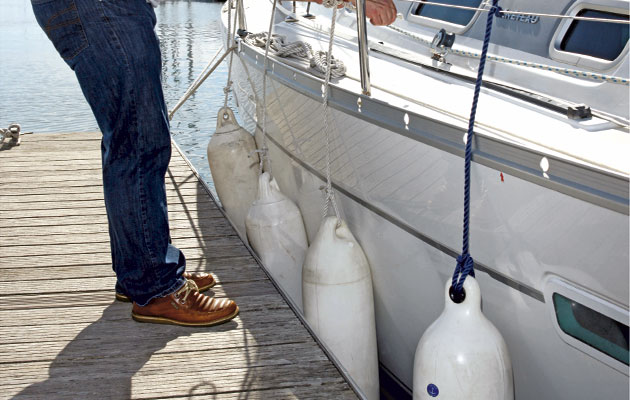
A nicely level line of fenders sends a good signal to the examiner
You don’t have to go to a sailing school to be a Yachtmaster. I love it when a candidate asks to be examined without training on his own boat. Don’t worry if she isn’t coded. There’s no legal requirement that she should be. Most of mine haven’t been either, and I couldn’t care less.
As an examiner, I want to see that your priorities are sound and that you’re thinking clearly and for yourself. On the day, the yacht must be clean, tidy and seamanlike. Waterline crisp, sail covers Bristol fashion, not looking like some poor bird with a broken wing, ropes carefully stowed, a comprehensive chart kit for the waters to be sailed, the makings of a meal plus snacks and, of course, everything that counts should be working.
What the examiner is looking for
Feeling relaxed in close quarters

Competent, confident boathandling counts well in your favour
If there’s one thing that will upset an examiner, it isn’t that you forgot to put on your lifejacket, it’s that he feels insecure when you begin manoeuvring in a marina. Take it from me, there’s nothing worse than sitting at the backstay wondering what you’re going to hit. If the boat slides sweetly out of her berth with everyone knowing what’s required and no shouting, then moves away easily with the examiner confident you’re in charge, that you’ve checked the next alleyway for collision risk, that your choice of speed is sensible and efficient and that it never enters his head to feel anxious, you’re well on the way to a pass after five minutes. No course can teach you this. It can only tick the box confirming you’ve managed it once or twice. The rest is up to you and your sea time.
Wind awareness
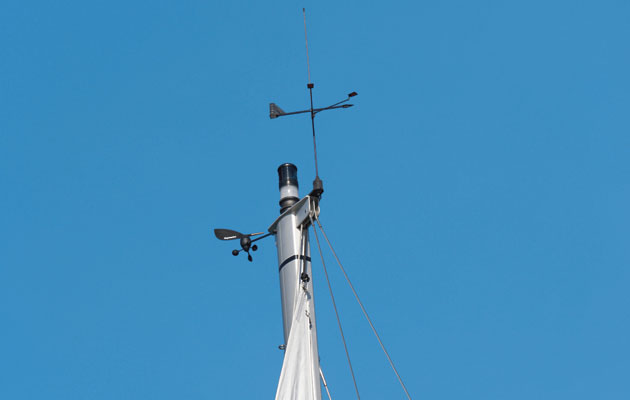
You should always be aware of the true wind direction and how it will influence any manoeuvres
Here’s another subject you can’t learn on a prep course. Knowing where the wind is and how it relates your position to any impending manoeuvres is critical. I often ask a candidate where the wind is coming from when he’s approaching a situation we both know will involve some sort of gyration under sail. If he looks instinctively at the masthead or, worse still, an instrument set to apparent wind, he’s dropped a bagful of points. At this stage, his mind should be setting up where the boat will best be placed to make her critical turns. Apparent wind isn’t going to help him much. What he should be doing is glancing at the water and noting the tiny ripples to assess what the true wind is actually doing. I’m often amazed at how many folk have never been shown how to do this. Racing sailors can handle it in their sleep, because they need to predict windshifts, but cruisers tend to get lazy, so make sure you can read the wind.
Good sailing
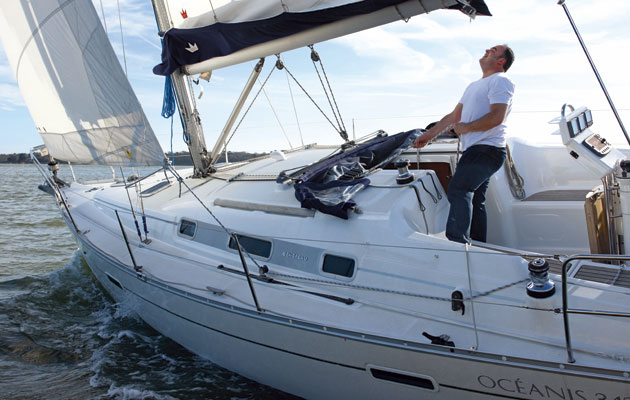
No need for incessant, race-style tweaking, but pay due attention to sail trim while the yacht is under way. If there’s a mainsheet traveller, use it
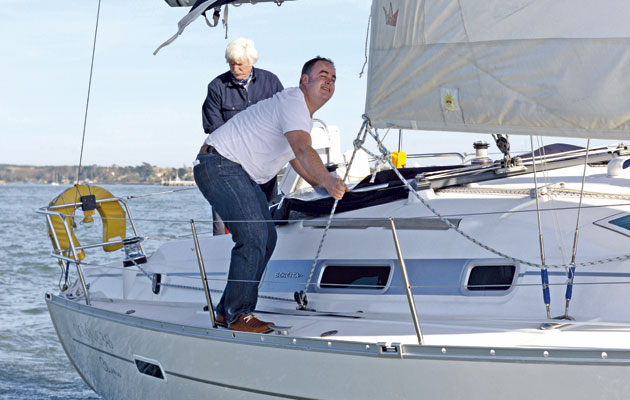
Ensure that the genoa sheet leads are properly positioned for the point of sail you’re on

Lovely: both mainsail and genoa set up with the right amounts of tension and twist
All examiners hate to see a yacht sloppily sailed on passage. Make sure that your crew are using the traveller, that genoa fairleads are properly positioned, that the main is well set up with kicker and mainsheet tension for twist. Above all, do not sail over-sheeted. It’s a dead giveaway that you just haven’t been out there enough yet.
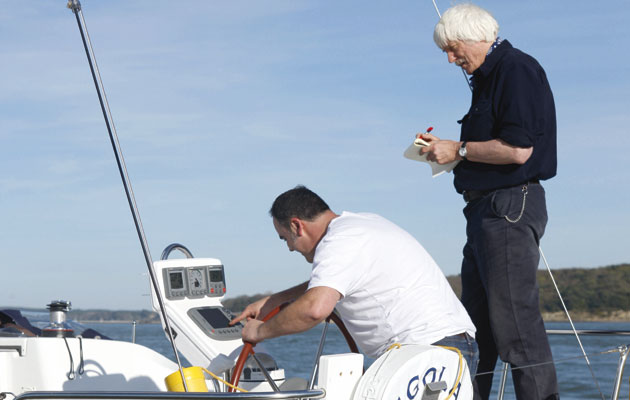
Too much staring at the plotter screen betrays nervousness
In the days before GPS set navigators free, people used to fail exams by what we called ‘sailing the chart table’ rather than skippering the yacht. Assuming the test to be all about some sort of imagined ‘correct navigational practice’, candidates nailed themselves to the navigatorium when they should have been up on deck directing operations and watching out for the ship coming up astern that was suddenly looking bigger every moment. Well, guess what? Nothing has changed. This remains a big problem with neophyte Yachtmasters.
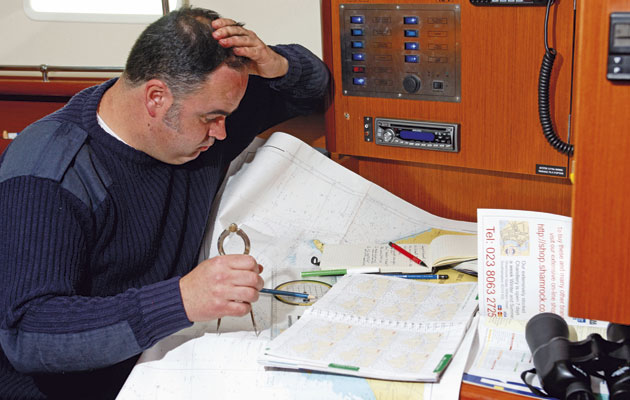
Sail the boat, not the chart table
The secret is to plan well, then nip below every so often on passage to keep an eye on what’s going on in the chart department and whizz back on deck pronto to carry on skippering the boat. I’ll lay a pound to a penny it’s what you do when there’s no examiner on board, so have the confidence to back your own usual practices. This is particularly important at night in crowded waters. An unsuccessful candidate often fails himself by allowing disorientation to creep in, simply by not keeping the true perspective on events, which can only be found on deck.
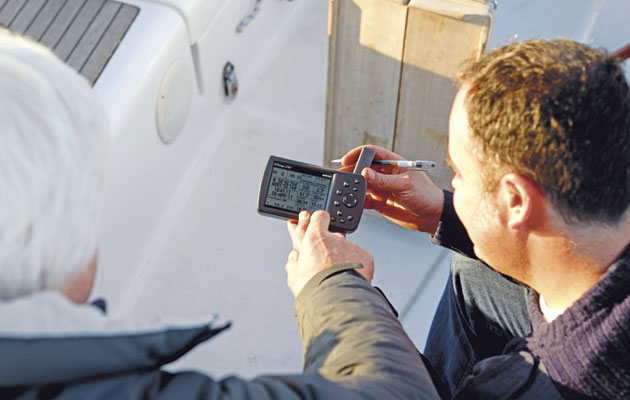
The use of electronic nav-aids such as GPS is not ‘cheating’ – it’s an integral part of navigation
All examiners have their own take on use of electronics. Personally, I want to know my candidate is making modern aids to navigation, including a chart plotter if there one, an integral part of his navigational policy. The idea, as one candidate suggested, that use of GPS is somehow ‘cheating’ is incomprehensible to me. I will almost certainly ask at some stage that the yacht be navigated classically, to see how easy my man is with what, for most people, are now backup skills. If I’m unconvinced by his performance, off he goes to think again.
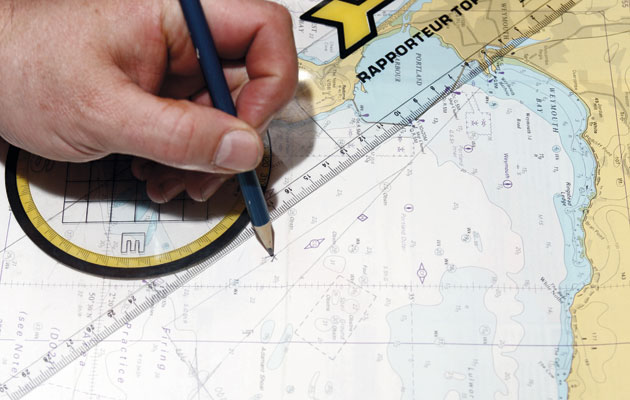
Your chartwork should be fluid and accurate
Skilled chartwork comes with use, and no amount of last-minute swotting can make up for weeks of doing it as a matter of course. Plotting traditional fixes is a good giveaway these days. With GPS all around us, we only do this for real when electronics fail. I’ve seen a person take 15 minutes to select three objects from a background studded with lights, then plot the results. The yacht had moved over two miles in the meantime…

It’s absolutely vital that you maintain a decent logbook during the exam
It’s absolutely vital, whether navigating with a giant chart plotter or a Walker log, that you maintain a decent log book. Without this, if GPS fails for any reason at all, you’re lost, Mate, so is your exam, and quite right too!
Take command
One of the most important questions on most examiners’ private lists is how good the candidate is at taking charge. If he’s managing well, we probably won’t even notice that he’s in command, that his crew all know what’s expected of them and that their skipper is quietly checking that they’re doing it. Good leadership is seldom about barking orders, and never about ignoring all on board, yet leadership is what being a Yachtmaster is all about. First, you must be sufficiently comfortable with your own skill levels not to have to worry about little things like picking up a mooring. Only then can you consider what may go wrong for the poor soul on the foredeck in a gale at midnight.
The classic skills
These are what most people imagine success in an exam is based upon. Actually, these basic skills merely help an examiner build up an overall picture of the candidate. It’s generally not a hanging matter if one manoeuvre goes a bit haywire. Even a grounding is often more interesting for what the candidate does about it than for the fact that it has happened. After all, nobody is perfect, especially under the stress of an exam.
Man overboard
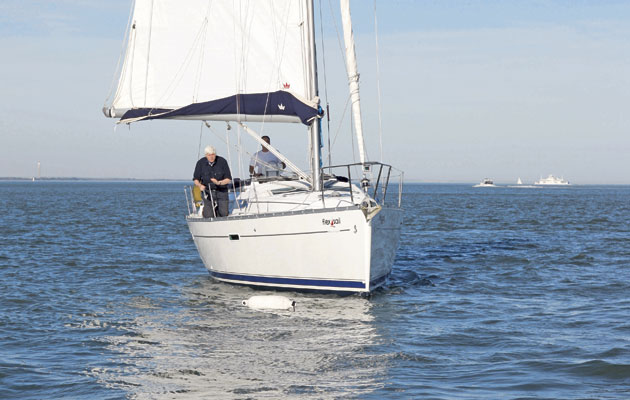
An effective, confidently executed man overboard drill speaks volumes about a candidate’s boat-handling ability but it’s not necessarily curtains if the manoeuvre goes a bit haywire
Errors in principle are not popular with examiners. Mistakes under pressure may sometimes be forgiven, and man overboard is a case in point. If the boat sails past the dummy with her mainsail full and the examiner asks, ‘What went wrong?’ It won’t get you much of a score if you reply, ‘I was going too fast.’
‘Candidate’s speciality, stating the bleeding obvious,’ the examiner will note on his pad, and move on, downhearted.
However, if you say, ‘I’m kicking myself because I was too far upwind and couldn’t de-power the main. I tried to get onto a close reach but I misjudged my approach,’ he’s more likely to take a lenient view – especially if you’ve opted for ‘Coastal’.
Securing the yacht alongside
When I was examining instructors regularly, I’d often sail up to Poole Quay (a tidal wall) shortly before closing time. I’d hop off the boat as soon as she touched the piling, saying, ‘You sort her out, skipper, I’m off for a quick pint.’ I’d then do just that. When I returned 10 minutes later, if the yacht was neatly snugged down with four lines ashore, ends on the dock, a fender board in place, sails neatly stowed and all hands below cooking and relaxing, the guy was in good shape for a pass. If I found discussions on deck about whether to ‘hand the end back for a spring’, and people blundering about in the dark, things didn’t look so bright for our hero. Have a system and know how to execute it.
… and don’t forget
Mooring and anchoring

Mooring and anchoring under sail should present no challenge to the aspiring Yachtmaster. When in doubt, drop the mainsail
These are Day Skipper skills that should pose no threat to a Yachtmaster candidate. Under sail, just remember first to assess whether the wind is with or against the tide. If you get lucky and it’s against, drop the main and arrive stemming the stream, spilling under headsail or creeping along under bare poles. If wind and tide are at all ambiguous, never forget the old adage – when in doubt, drop the mainsail.
Meteorology
As forecasting has become more comprehensive and accessible, I’ve noticed a reduction in candidates’ capacity to understand what’s going on and to read a bulletin creatively. Anyone who can’t describe the typical cloud sequence on a North Atlantic depression gets nil points from me, and failure to understand the basics of air masses is going to run up a black mark too. A favourite with examiners is to produce a weather map and invite their Yachtmaster to analyse it. Be ready, and know your subject.

Tom sees no reason not to have a chart in the cockpit, but some examiners disapprove of it. Be ready to justify your choice
Many candidates produce excellent pilotage plans for entering a strange harbour. I’m happy with that, and most examiners love it. Personally, I prefer to sketch a few notes on the actual chart and have it in the cockpit held down with a winch handle, yet I’ve met examiners who’d be horrified to see a chart on deck at all. So there you have it. Do what suits you best, then be ready to justify your choice. Actually, this advice is good across the board. The examiner wants to see what you really do, not some fantasy you’ve cooked up because you think he might like it. That is a weak candidate’s policy and it often backfires.

No shortcuts here, you just need to know your stuff – and finding the time to learn isn’t difficult
So far as the MCA is concerned, this is the crunch. Examiners are encouraged to demand high standards in this subject, and there’s no reason for a candidate, knowing full well he is to be put on the griddle, not to have the regulations burned into his heart. The best way to be exam-proof is to invest in A Seaman’s Guide to the Rule of the Road, available for modest money from all good chandlers or Bookharbour.com. Place it prominently in the heads some months before the exam and devote five minutes of the shining hour each day to digesting its wondrous contents. The book makes it easy and there’s no excuse for disappointing the Board of Trade!
For all the latest from the sailing world, follow our social media channels Facebook, Twitter and Instagram .
Have you thought about taking out a subscription to Yachting Monthly magazine?
Subscriptions are available in both print and digital editions through our official online shop Magazines Direct and all postage and delivery costs are included.
- Yachting Monthly is packed with all the information you need to help you get the most from your time on the water.
- Take your seamanship to the next level with tips, advice and skills from our expert skippers and sailors
- Impartial in-depth reviews of the latest yachts and equipment will ensure you buy the best whatever your budget
- If you are looking to cruise away with friends Yachting Monthly will give you plenty of ideas of where to sail and anchor

Chieftain Training
RYA & STCW Courses – Sail, Power, Super-Yacht & Workboat
How to Pass the Yachtmaster Exam
Yachtmaster certificate of competence exam top tips, which yachtmaster.
First we need to be clear which Yachtmaster exam we are talking about. Leaving things like the Yachtmaster Instructor and Examiner Qualifications aside there are no less than 8 separate RYA certificates that are called “Yachtmaster”. This includes the 3 independently examined levels of Yachtmaster Certificate of Competence, (coastal, offshore and ocean).
RYA MCA Coastal Skipper & Yachtmaster Offshore Shorebased Course
( Yachtmaster Offshore Shorebased for short). This is a 6 day course which includes three written papers. It is assumed knowledge for all of the certificates that follow, so we will assume for the purposes of this article that you have already completed this course.
Yachtmaster Coastal Certificate of Competence (power or sail)
This certificate follows the successful completion of a practical exam which is discussed in this article. The exam can be taken on board a sailing yacht or motor boat, (and the qualification is endorsed for the relative type of craft). The Yachtmaster Coastal CoC certifies skippers to operate up-to 20 miles from a safe haven on board commercial vessels up-to 24m, carrying up-to 12 passengers. It can also be used as an entry requirement for super yacht Officer Training ( OOW 3000 ).
Yachtmaster Offshore Certificate of Competence (power or sail)
A higher level practical exam, also discussed in this article. This certifies skippers to operate up-to 150 miles from a safe haven on board commercial vessels up-to 2000 tonnes, (again with up-to 12 passengers). It can also be used as an entry requirement for super yacht officer training and is a requirement to progress onto Yachtmaster Ocean CoC (below) and/or MCA Master 200 .
RYA MCA Yachtmaster Ocean Shorebased Certificate
aka Ocean Shorebased . This is a 5 day (or 40 hour online) course which includes one written paper. It is assumed knowledge for the oral exam that follows and beyond the scope of this article. You can read all about the Ocean Yachtmaster Course and Exam here .
Yachtmaster Ocean Certificate of Competence (power or sail)
An even higher level certificate that qualifies the holder to skipper beyond the 150 mile from a safe haven limit of the Yachtmaster Offshore CoC. The Yachtmaster Ocean exam is an oral exam and one of its pre requisites is the Yachtmaster Offshore CoC (above).The Yachtmaster Ocean Exam is beyond the scope of this article, but by popular request we have written a separate article about it, MCA Yachtmaster Ocean Certificate of Competence .
RYA MCA Yachtmaster Coastal and Offshore Certificate of Competence Practical Exam
Getting back on topic this article specifically relates to the two practical exams (Coastal and Offshore), each can be taken onboard a sailing yacht or motor boat.
The exam for the Yachtmaster Coastal CoC and the Yachtmaster Offshore CoC is very similar and in fact different candidates can be examined together even if they are not taking the same level.
Exams are conducted with 1-4 candidates on board the vessel.
You can take the Yachtmaster exam on a sailing yacht or motorboat, and you will become a Sail or Power Yachtmaster as appropriate. This article covers sail and power exams as much of the advice is generic.
The RYA/MCA Yachtmaster qualification is the global standard for sailing and motor boating. The definition of a Yachtmaster Coastal/Offshore is: ‘A yachtsman or woman competent to skipper a cruising yacht on any passage that can be completed without the use of astro navigation.’
The RYA/MCA Yachtmaster Certificate of Competence remains the logical target of many a self-motivated sailor. It also represents the icing on the cake for those looking for the reassurance of an external assessment.
How long is the Yachtmaster Exam?
There can be up to 4 candidates on the boat with the examiner. A examiner will not conduct more than 4 exams at once and will not plan to examine more than 2 candidates in a 24 hour period. He/she will need to see each candidate skipper the boat underway by night.
Yachtmaster Coastal Exam Duration
- 1 Candidate – 6 to 10 hours
- More than one candidate – 4 to 8 hours each
Yachtmaster Offshore Exam Duration
- 1 Candidate – 8 to 12 hours
- More than one candidate – 5 to 9 hours each
For many candidates this means there will be a pause mid-exam while they and the examiner get some sleep before restarting in the morning. It is not unknown for exams to span two nights if there are 4 candidates (for example Friday evening 1800- Sunday morning 1100)
Listed below are some top tips to help you prepare for your RYA/MCA Yachtmaster exam.
Prepare early for your yachtmaster exam.
Most candidates spend some time with an Instructor, whether this is a 5-day preparation course with a sea school or some bespoke tuition on board their own boat. A half decent Yachtmaster Instructor will take you through many of the exercises that an Examiner will expect you to demonstrate and will put you in the mind-set of an exam candidate.
On the day of the exam make sure you are ready in good time so that you aren’t involved in a last-minute faff. If you’re relaxing in the cockpit with a cup of tea when the examiner arrives, the examiner will be more impressed than if you’ve put yourself under stress attempting to work out the day’s tidal heights or secondary ports last minute!
When given a navigation task, prepare fully, make notes, prepare pilotage sketches and plan well! Nip below every so often en route to keep an eye on what’s going on in the chart department and whizz back on deck pronto to carry on skippering the boat. Don’t panic and don’t spend all your time sat behind the chart table, taking no notice of what’s going on around you, this is an obvious sign of someone who is ill prepared for the passage they are skippering.
HAVE YOUR YACHTMASTER EXAM PAPERWORK READY (and the kettle boiling)
The very first part of the exam will be paperwork. Before the examiner can proceed he/she will;
- Ask for your completed exam application form, be sure it is completed in advance and details your qualifying sea time.
- Ask for payment, (the examiner can not proceed if you do not pay up front)
- Ask for sight of your Short Range Certificate , (or a pass form if you have recently taken the course and exam and are awaiting the actual certificate). Higher level GMDSS certificates are acceptable.
- Request a passport photo of you (write your name on the back).
- Chat with you about your yachting background and qualifying sea time
- Outline what he/she expect from you over the coming day(s).
If you are applying for a commercial endorsement at the same time you will also require as a minimum;
- PPR Certificate
- Sea Survival Certificate
- Seafarers Medical Certificate
- Commercial endorsement form and payment
You will also need to hold an in date First Aid Certificate .
BE TIDY AND ORGANISED THROUGHOUT YOUR YACHTMASTER EXAM
First impressions count! Make yourself presentable and ensure you’re looking professional. That’s you and the boat!
Make sure the yacht is clean, tidy and seamanlike. The waterline crisp, sail covers looking ship shape, ropes coiled neatly and carefully stowed and fenders aligned. An experienced skipper once told me, you should know your boat so well that you should be able to find anything you need at any moment in time, including at night during power failure! A tidy boat is a sure sign of a safe boat.

PRACTICE MAKES PERFECT PREPARATION, FOR YOUR YACHTMASTER EXAM
Repetition, repetition, repetition. There is no point in having sailed (or motored) thousands and thousands of nautical miles if you can’t carry out Day Skipper tasks. If you can not confidently demonstrate all boat handling or seamanship skills, such as picking up a mooring buoy or putting a reef in, then you’re not ready for the exam yet!
There is nothing worse than entering or leaving a marina, wondering if you’re going to hit something. Brief your crew, make sure everyone knows what they are doing, and proceed with confidence. If the boat slides smoothly out of her berth with crew briefed and knowing what’s expected you will look good. Your calm manner, and a sensible amount of revs for power handling will immediately put the examiner’s mind at ease and give no reason for concern. If Plan A fails, take a breath, and start over. The examiner understands that mistakes can be made under exam conditions, he/she will be more impressed if you stop, recompose yourself and get the manoeuvre right, rather than continue to try and complete a bodged first attempt. There is no such things as a perfect exam, every candidate will make small mistakes, the stronger candidates will spot them, themselves and do something about them.
Without a doubt, you will be quizzed on COLREGS . There’s no reason for a candidate, not to have these regulations engrained into their brain. A good way of ensuring you have these nailed, is to study ‘A Seaman’s Guide to the Rule of the Road.’
YACHTMASTER EXAM IRPCS
There is no need to learn the collision regulation parrot fashion but you should have a working knowledge of every rule and you should be able to;
- Identify any vessel at night by lights
- Describe the day shape for any vessel
- Describe the fog signal for any vessel
- Explain any rule
- Apply the collision regulations practically through the exam
- Explain what actions you would take in fog if you have detected another vessel by radar alone.
Candidates who forget a particular rule such as “ what does a vessel constrained by night display at night? ” MAY still pass if they know the rest of the rules and are otherwise strong, however a candidate who fails to apply the rules correctly when he/she is skippering will fail. If a large vessel sounds 5 horns at you during your exam you are going to have to work very hard to recover! Do not put yourself in a position where this might occur.
YACHTMASTER OFFSHORE SHOREBASED KNOWLEDGE
Be ready, know your subject.
You can be quizzed on anything within the RYA Yachtmaster Offshore Shorebased Course, you will also be expected to put the navigation, IRPCS, passage planning and forecast skills from this course into practice. If you don’t have this knowledge then you are waisting your exam fee as you will fail. You will also be tested on a basic understanding of Radar and Diesel engines . I am a strong believer that all Yachtmaster candidates as well as having passed the Yachtmaster Offshore Shorebased course should also have attended the following courses before taking their practical exam as you can be tested on any and all of these areas.
- RYA Short Range Certificate , it is likely you will each be quizzed on VHF procedures, distress alerting, the mayday call or other calls during the exam. You may also need to make a routine call to a marina or harbour during the exam.
- RYA Sea Survival . The safety brief that you deliver will include lots of content from this course, (i.e flares, EPIRB, life raft and life jackets), you can expect to be questioned on more detail on these and other areas.
- RYA Diesel . Typically candidates will be examined on engine checks and they will also be given a part of the engine to talk about or a common problem to solve, for example, “ Can you talk me through how you would bleed the full system on this engine ,” or “ Show me the components of the cooling system and explain which part of it may need servicing at sea if the system has run dry for a brief period’ “
- RYA Radar. If the vessel is fitted with a radar you will be tested on its basic set up and use. You should be able to fix position by radar, find a spot on the chart by radar and identify when a risk of collision exists by radar. If there is not a radar set on board, any of this can be tested theoretically. All candidates should be tested on radar and motor candidate tend to be pushed a little further on this area, (while they escape the sailing part of the assessment).
- RYA First Aid . While you are required to hold a First Aid Certificate, Yachtmaster examiners will not test First Aid beyond the treatment for hypothermia, the effects of cold shock, calling for medical assistance and discussing evacuation by helicopter.
TAKE CHARGE DURING YOUR YACHTMASTER EXAM
One of the key things an examiner is looking for, is to see how good the candidates are at taking charge. This is more than just a sailing (or motoring) exam it is a skippering exam. Can you manage your boat? Can you manage your crew? Clear, decisive and safe briefings followed by ongoing directions to the crew are required.
Good leadership and seamanship alike, do not involve barking orders, it is about being in control in a calm, effective and efficient manner while showing you can skipper (lead). Demonstrate your organisational and methodical thinking.
Play to your strengths. There is no definitive way to be a skipper, so don’t change your tried and tested methods to try and impress. Stick with what you know and carry them out smoothly and confidently. Don’t rush and panic. “Go slow like a pro.”
YACHMASTER EXAM MAN OVERBOARD
It is almost a, “dead cert,” that each candidate will be asked to demonstrate a MOB drill at some point during the exam. This is typically done using a fender or similar attached to a small weight, (never a real person). There is a myth that Yachtmaster Examiners expect the drill to be carried out by the “RYA method,” and this is true, what is not true however is the various myths of what constitutes the RYA method!
Yachtmaster Exam – Man Overboard RYA Method
Your examiner will expect you to a take charge, not to loose sight of the MOB (fender), to get back to it safely without endangering other crew and to get the boat stopped alongside the casualty with the casualty somewhere safe (i.e near the leeward shroud on a sail boat and not too close to the props on a motor exam), ready for pick up back on board.
Man Overboard Exam Tips
If you are training with other candidates agree a method that works for all of you. When you are the skipper under assessment you want your crew to react and know what is expected of them. If each candidate on the same boat opts for a different MOB method it can lead to confusion.
Along the way you should simulate/say everything relevant to the casualties survival (mention throwing the MOB gear overboard, appoint a spotter, press the MOB function on the GPS, tell the examiner you would assign a crew members to issue a distress alert and Mayday call).
Man Overboard Exam Tips (for sail candidates)
In addition to the tick list in the above paragraph, use the engine! The exact drill of how you reach/tack, slow down, speed up etc. will vary from candidate to candidate and boat to boat. The important thing is that the method you opt to use works and is safe. I advise against gybing during your MOB drill in medium and stronger winds.
A sail candidate who opts to approach the casualty from upwind (where the mainsail will be filled as you sail or motor downwind) would be demonstrating a gross misunderstanding of how to control speed and how to stop a sailing yacht.
Man Overboard Exam Tips (for power candidates)
In addition to the tick list two paragraphs above be mindful of the rest of the crew. If at high speed when the MOB occurs, don’t turn suddenly, instead slow the boat down and ensure crew know if you intend to make a sharp turn. We don’t want a crew ember (or the examiner) to fall over or worse overboard! On many boats in light and moderate conditions you can turn the boat and follow your wake to return to the MOB, in rougher sea states this might not work. There are basically three steps.
- Dont loose the MOB’s position
- Get back to the MOB
- Get alongside the MOB for pick up, without running him over
On many motor boats having got the boat back to the vicinity of the MOB, it pays to orientate yourself beam onto the wind and upwind of the MOB and allow the vessel to be blown sideways towards the MOB, this protects him/her from the risk of the bow and engine and is often referred to as the drift down method. As with sailing there are lost of variations on this method and what is important is the method that you use is safe and that it works.
YACHMASTER EXAM SAILING MANOUVERS
It is likely that you will be asked to either sail onto or sail off a swinging mooring (mooring bouy), an anchor or a pontoon. Make sure you are comfortable and competent at all before your exam. By way of example I will focus here on the mooring buoy. In non tidal waters the boat will lie on the mooring head to wind so the approach will be on a close reach under mainsail. In tidal waters certain combination of wind against tide may dictate an approach under headsail on a different point of sail.
The examiner will expect to see you;
- Brief the crew on how the manoeuvre will be performed
- Helm throughout the manoeuvre
- Prepare the boat for the manoeuvre (using the crew)
- Select the correct direction and angle of approach
- Select the correct sail combination for this approach
- Control the boat speed on the approach bringing the boat to a stop in a controlled manner
- Picking up and secure to the mooring bouy safely
If at any point the manoeuvre is not working the examiner will expect you to make the decision to bail-out and to have an escape plan in mind. Remember it will be your call to bail out not his.
YACHTMASTER EXAM, BOAT HANDLING UNDER POWER
During the exam you will have to demonstrate some boat handling under power. This may be a natural part of a passage you are skippering (i.e. at the start and end of the passage) or may be a specific boat handling session. Most candidates will demonstrate they can moor up, depart a berth and turn the boat in a confined space. You may be asked to demonstrate more than one berth so the examiner can see how you respond to different states of wind and tide. Some times an examiner will be specific (for example ask you to berth starboard side to, stern first on pontoon XYZ), other times he will leave some of the decision making to you and simply say berth on pontoon ABC. In the second example he will expect to see you make a sensible decision as to whether to moor bow or stern first and from where to approach. If you are asked to repeat a manoeuvre performed by another candidate do not make the mistake of blindly copying the last candidate, take a minute to consider if they did it well or if an alternative approach would work better. Every boat manouvers differently but there are some givens for close quarter handling;
- Slow is Pro!
- Approaching down forces i.e. down tide (or down wind if no tide) is poor seamanship if you have the option not to
- Using excessive engine revs in confined space demonstrates a lack of experience and control
- Turning against prop walk should be avoided if possible.
- Using wind, tide, pivot points, momentum and prop walk to assist you will all make your manoeuvring easier and, “score you points” in the examiner’s mind.
If the manoeuvre is not working, bailing out safely is far better than perceiving trying to a make the best of a bad job. I can assure you that if you are half way through a manoeuvre and suddenly realise you have selected the wrong approach the examiner has spotted this several minutes earlier. He/she will be quietly hoping you opt to rectify the error rather than compounding it by continuing. Don’t disappoint him by continuing an approach that is clearly too fast or not going to work.
Just like the sailing manoeuvres described above you need to helm the boat through these manoeuvres, brief the crew and perform the manoeuvre well. You should not rely on crew jumping ashore with lines to stop the boat, you as helm should stop the boat so that crew can step ashore safely. If a spring line is appropriate to depart a berth then use it, but don’t over complicate things. It is quite embarrassing when a candidate opts to “spring off” a “wind off” berth when they could have simply just let the lines go. If manoeuvring in close quarters still phases you then you are not ready for the Yachtmaster exam and need some more boat handling practice first.

YACHTMASTER EXAM SUMMARY
There are many more components to the exam (pilotage, blind pilotage, voyage planning etc.) and the above is just a taster. If I have not scared you off yet, you have your own boat and require bespoke training (power or sail) I can be contacted through this site.
Yachtmaster Instructor
Share this:.

RYA Yachtmaster Offshore
Find out About the Yachtmaster Offshore Theory & Practical Training, (both Online & Shorebased)
Use the global Yachtmaster Offshore Directory to Find a Course Near me (Select any Location)
Page Navigation
- RYA Yachtmaster Offshore 200GT
- RYA Yachtmaster Offshore Requirements
- Course Breakdown
- RYA Yachtmaster Offshore Limited Theory
- RYA Yachtmaster of Yachts Practical Course
- RYA Yachtmaster Offshore Practical Examination
- RYA Yachmaster Offshore Certificate
- RYA Yachtmaster Offshore Commercial Endorsement
RYA Yachtmaster Offshore (Yachtmaster 200GT & 150NM Limited)
An RYA Offshore certifies an individual as competent to captain a vessel up to 24m in length and no more than 200 Gross Tonnes. The offshore certification is applicable passages during which the yacht is no more than 150 miles from harbour.
The Yacht master offshore consists of two components:
- Yachtmaster Offshore Theory
- Yachtmaster Offshore Practical
Both components can be done on an individual basis but in order to achieve a commercial endorsement for the yachtmaster offshore certificate of competency, both the theory and practical examinations must be passed.
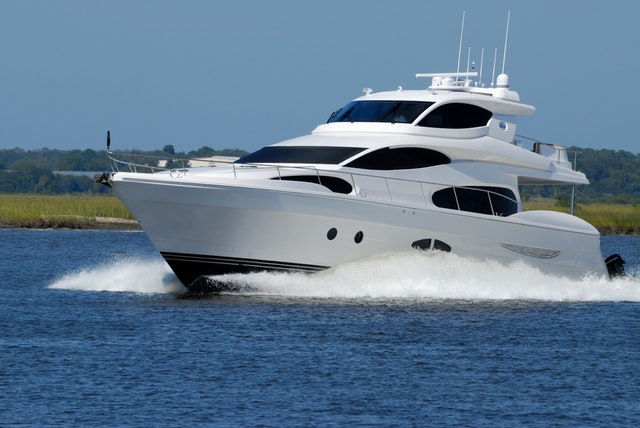
Yachtmaster Offshore Requirements:
In order to be eligible to take the Yachtmaster Offshore practical exam, candidates must meet the minimum sea time requirements.
The RYA Yachtmaster Offshore minimum sea time prerequisites are as follows:
- 50 days at sea on yachts up to 500GT
- 5 days as skipper on vessels less than 24m LOA
- 2500 miles on yachts up to 500GT
- 5 passages over 60 miles long, which must include 2 overnight passages and 2 as skipper
If a candidate already holds an RYA Yachtmaster Offshore Certificate of Competence for a different vessel type (Ie. power or sail) then the above prerequisites are adjusted as indicated on the RYA's Yacht Master Offshore Exam page.
Yachtmaster Offshore Course Breakdown
The Yachtmaster Offshore course consists of a 40-hour (minimum) theory course (excluding exam time), 5 days of practical training and preparation followed by a 2-day practical examination.
Yachtmaster Offshore Theory:
The following topics are covered during the Yachtmaster Offshore theory course:
- Position fixing,
- Course shaping and plotting,
- Tidal knowledge,
- Use of almanacs and admiralty publications,
- Electronic position finding equipment,
- Taking and interpreting forecasts,
- Plotting weather systems,
- Weather predictions using a barometer.
- Certificate issuing criteria
Yachtmaster Offshore Theory Online
The RYA Yachtmaster Offshore Theory can be studied in an online or virtual distance learning format. The online version of the course allows students to work through the training content at their own pace, which may benefit those who are working with little time off.
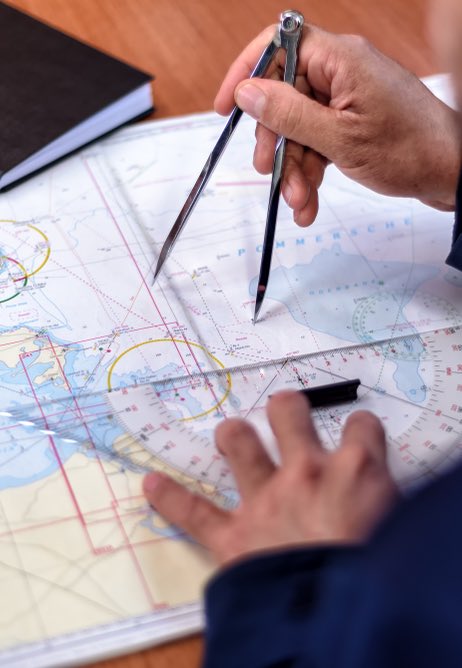
Yachtmaster Offshore Practical
Although there is no formal training course leading up to the RYA Yachtmaster Offshore Practical exam, it is common for yacht crew to complete a practical training course, leading up to the exam. This may vary slightly between schools but should be done at an RYA accredited center.
The exam will include an assessment of your skippering skills, boat handling, general seamanship, navigation, safety awareness and knowledge of the IRPCS, meteorology and signals.
RYA Yachtmaster Offshore Practical Exam:
A valid GMDSS-approved SRC Radio Operators Certificate and a First Aid Certificate are requirements for the RYA Yachtmaster Practical examination. The Elementary First Aid Certificate as acquired during STCW Basic Training is an accepted version. For recreational sailors, an RYA First Aid certificate is sufficient.
In addition to this, candidates need to ensure that they have met the minimum sea time prerequisites as highlighted above.
Practical Exam Assessment:
The exam will include an assessment of:
- The candidate's skills as a captain,
- Boat handling ability
- General seamanship,
- Navigation planning and execution
- Safety awareness and procedures
- Knowledge of the IRPCS,
- Meteorology,
- Lights, shapes, sounds, and other signals.
Practical Exam Duration:
- 8-12 hours for 1 candidate,
- 10-18 hours for 2 candidates.
- No more than two candidates can be examined in 24 hours and no more than four candidates can be examined in one 2-day session.
RYA Yachtmaster Offshore Certificate
Students who pass their Yachtmaster Offshore practical and theory examinations will be awarded an RYA Yachtmaster offshore certificate of competency. It is important to understand that CoC is a recreational license until it is commercially endorsed by the MCA.
RYA Yachtmaster Offshore Commerical Endorsement
In order to commercially endorse your Yachtmaster offshore certificate, you will need to submit the following:
- Original Yachtmaster Offshore certificate
- RYA Professional Practices and Responsibilities certificate
- an RYA commercial endorsement application form
- Your original, completed ML5, ENG1 , or an ENG1 equivalent medical form.
- A copy of your RYA Basic Sea Survival certificate or STCW Personal Survival Techniques
- A copy of your RYA Marine Radio SRC Certificate or other acceptable GMDSS Marine Radio Operator's Certificate .
- A passport-sized photo with your name on the back
- The application fee
RYA Yachtmaster Offshore License
A license card/ book will be provided to those who pass the relevant Yachtmaster offshore examinations. The license will include a photo, and details about the license holder, and will also include information about the endorsements associated with the license.
RYA Yachtmaster Offshore Training School Locations
Brazil Sao Paulo
Croatia Split
Greece Corfu
South Africa Cape Town Langebaan

Spain Barcelona
Turkey Marmaris
United Kingdom England Ireland Scotland
West Indies Antigua
Username or Email Address *
Remember me Lost your password?
Username or Email
Get New Password

RYA Yachtmaster Offshore / Yachtmaster Coastal / Master of Yachts 200 Course 300
MPT is the most complete full service private maritime school in the country and has been training mariners since 1983. Our Fort Lauderdale based campuses host over 45,000 square feet of classrooms, deck and engineering training labs, the Ship's Store, and student service facilities.
Preparing for RYA Yachtmaster Offshore / Yachtmaster Coastal / Master...
Course description.
Yachtmaster Certificate of Competency
The Yachtmaster Qualification is the pinnacle of the RYA (Royal Yachting Association) Training and Certification System. It is widely recognized throughout the world as a prestigious accomplishment.
Holding this credential can:
- Improve your resume for any deck department position on yachts - Serve as prerequisite training for an MCA OOW 3000 GT CoC - Professional Development in your yachting career - Serve as your Certificate of Competence (CoC) for operators of yachts up to 200 tons
The Yachtmaster Course should be undertaken by crew aspiring to advance to the MCA OOW level up to 3000 tons and by those who are advancing to the command level for Master of Yachts up to 200 tons.
2 Routes Available – Same Course:
Yachtmaster Coastal Yachtmaster Offshore
Yachting professional candidates are encouraged to start their training and professional development as early in their career as possible. Many will take their STCW Basic Safety Training Program (#140) and then when they qualify, it is recommended to obtain the Yachtmaster Coastal CoC. Candidates wishing to upgrade to the offshore route later can simply examine, without additional required training.
Whether you qualify for the Yachtmaster Coastal or Offshore, the training is the same. The only difference is your experience and practical skill level. You will be examined towards whichever level you qualify for.
The MPT Yachtmaster Coastal and Offshore Course (#300) is taught on a Motor Yacht and the practical training and examination are towards a Motor Certificate of Competence. (If you are applying for a Sail Endorsement, this course will not satisfy your practical training and exam requirements). All sea time must be on a power boat and not on a sail boat under power. The Theory, SRC, PPR, and Basic Training courses are the same for both schemes.
The MPT Yachtmaster advanced level certification is available in a 2 week + exam program combining shore-based theory and practical hands-on techniques for a Motor Vessel and the RYA Practical Examination. The first week of class is in the classroom (theory) and the second week is Practical, out on the boat. In addition, there will be class on Saturday of the first week so please plan accordingly.
YACHTMASTER COASTAL & OFFSHORE Subjects Include:
One week (40 hours) of comprehensive shore-based theory module with written assessment papers including navigation, tidal calculations, international and inland rules of the road, coastal pilotage, meteorology, anchoring and mooring, docking and undocking, buoyage systems, safety, voyage and passage planning, general ship knowledge and seamanship. A theory examination will be conducted after the completion of the 40-hour theory portion of the program.
One week of Yachtmaster Offshore/Coastal practical training is conducted on board one of MPT’s Yachts. These yachts are up to 48’ and are twin screw motor yachts. This part of the instruction covers seamanship skills such as nautical terms, tides, marlinespike seamanship, anchor work, boat handling, docking, general yachting skills, basic weather, navigation and passage planning. This course will be a preparation course for your final Yachtmaster Coastal/Offshore Examination. The practical portion of the course will be conducted during daytime, evening and occasionally may include weekend hours.
The Yachtmaster Course #300 is an Advanced Review Course and it is assumed that candidates will have the prerequisite knowledge of the Basics of Navigation and recommended to the level of RYA Day Skipper, and the very least, the level of the Essential Navigation On-line course. To increase your likelihood of success, we recommend taking the online pre-course - ESSENTIAL NAVIGATION. Additionally, flash cards are available in the MPT Ship's Store for rules study in lights and shapes. Also, many Apps are available to assist in these subjects for pre-study. It is also strongly advised that you pick up your study material well in advance of the start of your course. Pre-study is essential for a successful outcome of this course.
The RYA Yachtmaster course is accredited by the RYA and MCA and recognized for service as Captain or Mate (OOW) up to 200gt up to 150 miles from a safe haven, at the Offshore level or up to 60 miles from safe haven at the Coastal level.
The Yachtmaster CoC meets the STCW A-V1/1 and section A V1/1-4 when combined with Basic Training Courses. Yachtmaster Offshore fulfills the prerequisite for MCA OOW 500 and 3000 GT and the MCA STCW A-II/2 Command Certificate for Master 200GT.
Sea Service Prerequisites (minimums): Note you must be able to provide proof of your sea service before undertaking the exam. This should be provided at least 2 weeks before the course when possible to allow our team to review it and ensure your eligibility for the course. Speak to your MPT Career Counselor or your instructor for assistance.
Sea Service can be proven by submitting one or more of the following:
- Log book (RYA or other acceptable)
- Sea Service Testimonial Letters from captains, owners or operators of vessels outlining vessel specifics, time underway, your capacity served onboard and the location of the service (tidal or non-tidal waters, etc).
- Sea Service Forms (calendar style - provided you can supply all of the additional information such as number of miles, etc.) Method 2 is preferred.
Yachtmaster Coastal: Motor - Option 1
Without RYA Coastal Skipper Practical certificate:
- 2 days as skipper on vessels of less than 24 meters
Note: No more than half of the required miles can be on vessels over 24 meters
Yachmaster Coastal: Motor – Option 2 A & B
With RYA Coastal Skipper Practical Certificate:
Can be used to enter OOW 3000GT program and modules
A. Mariners with Coastal Skipper Practical Certificate and with more than half of required sea service on vessels less than 24 meters
- 20 days on board
- 2 days as skipper on vessel less than 24 meters
B. Mariners with Coastal Skipper Practical Certificate and with more than half of required sea service on vessels greater than 24 meters
- 30 days on board
Yachtmaster Offshore: Motor
- 50 days sea time overall on motor vessels
- 5 days in the command position on the vessel (as Master)
- 2500 nautical miles logged with half transiting through tidal waters and half on a vessel of less than 24 meters that is not a tender.
- 5 passages over 60 nautical miles, including 2 overnight and 2 in command (as Master) of vessel.
Yachtmaster Ocean:
- Obtain Yeachmaster Offshore
- Complete the RYA astro/ocean shorebased theory #306
- Ocean passage of 600 nautical miles or more as captain or mate
- Complete oral exam with RYA examiner successfully
For Commercial Endorsement:
In addition to the SRC and First Aid (must have been taken within 5 years) you will need to obtain an MCA Certificate of Medical Fitness (ENG-1) as well as the Personal Survival Training (4 Modules of STCW 210) and the online Professional Practices & Responsibilities (PPR) Certificate. If you are planning to work commercially, you should simply add the STCW Basic Training Program, which will include the approved Personal Survival and First Aid automatically and will also allow your Yachtmaster CoC to have the STCW endorsement as well. Most boats internationally require this of all crew working commercially. We also recommend the Security Awareness or Designated Security (VPDSD) Course if you are working commercially as well. These are all separate fees from the Yachtmaster Course however MPT offers Package discounts, speak to an MPT RYA Specialist for more information and assistance. There is also a fee candidates will pay to the RYA for the commercial endorsement.
Written & Practical Exam Information:
The written exams are administered at MPT at the end of the shore-based theory segment of your program. They include all of the topics covered in the course. All of the shore-based courses and experience criteria must be fulfilled before the RYA Examiner will conduct the practical assessment. The final exam will be conducted by an independent and unbiased RYA Yachtmaster examiner and takes the form of an extensive oral and practical examination on a motor yacht. Candidates who have taken MPT's Yachtmaster course may use one of the MPT vessels for the exam at no additional fee. The practical exam will take an additional one-two day and is scheduled when the examiner is available and generally immediately after the course, weather permitting. Once your eligibility has been reviewed (sea time and prerequisites met), the schedule for the practical examination is predicated on several things:
1)The weather as this is a practical underway examination 2)The availability of the RYA Examiner (this is not an MPT employee)
Examinations may need to be scheduled for additional days which may not be consecutive to the dates of the course.
Exam Subjects:
We will review with you the knowledge-based subjects during your shore-based theory week and also fine tune your boat handling skills during your practical course, but you should be familiar with the following areas when you join the class and proficient by the exam date. (Note if you are not already well versed in these subjects when you arrive, you are strongly encouraged to take the Essential Navigation (online course) as there is not sufficient time to cover the basics in the 2-week program. Ask about #333)
- Knowledge of the International and Inland Rules of the Road.
- Safety. The candidate will be expected to know what safety equipment should be carried on board a yacht.
- Boat Handling, Maneuvering, Docking: Yachtmaster Coastal students will be expected to answer questions & demonstrate ability in simple situations only. Yachtmaster Offshore candidates are expected to demonstrate ability in more complex situations and will also be expected to show a higher level of expertise.
- General seamanship, including maintenance.
- Responsibilities of the skipper
- Navigation, Basic Weather
- Radio Communication & Signaling
- Command presence, management and direction of crew.
- Essential Navigation (online course)
Practical Exam Fees:
The RYA Examination Fee for the initial examination will be paid by MPT as part of your course tuition. Additional RYA fees are paid by candidate if a subsequent examination is needed.
If at the end of your course you wish to postpone the practical exam date, you are permitted to return for exam and RYA exam fee paid by MPT, within one calendar year, space permitting.
Additional Recommended or Required Courses:
- Essentials of Navigation (Online Pre-Course) #333
- First Aid & CPR #143 or Take STCW Basic Safety Training #141, 142, 143, 144
- SRC VHF Radio License #303 Required (offered Online) or GMDSS GOC #404
- RYA PPR (Professional Practices & Responsibility) #335 ONLINE COURSE
- MCA Approved Engine Course #440
- USCG Radar Course #148 & ARPA Course #150 or MCA Nav/Radar/ARPA Course #402
If you have three years of yacht service, speak to a career counselor about continuing straight through your OOW or Chief Mate 3000 GT program.
Required Materials
RECOMMEND PRE-STUDY: Essential Navigation online, course #333, COLREGS Study Apps or flashcard, and course notes. AVAILABLE IN MPT SHIPS STORE or bring with you the following: Pencil (mechanical or #2) Paper Chart Eraser (We recommend white- like magic rub or Staedtler), Navigation Tools (parallel rules/Portland plotter/triangles – your choice), Dividers (we recommend two- one as divider and one as compass), Calculator (we recommend the TI-30x), Hand Bearing Compass - optional though recommended (We recommend Weems & Plath #2004). Pick up at MPT when you register or when you check-in: Yachtmaster Shore based Training Manuals & Charts (provided by MPT).
11 day class in Fort Lauderdale
RECOMMENDED PRE-STUDY: Available at MPT Ships Store Complete Course Training DVD Flashcards AVAILABLE IN MPT SHIPS STORE OR BRING WITH YOU: Pencil (mechanical or #2) Paper Chart Eraser (We recommend white - like magic rub or staedtler) Navigation Tools (parallel rules/Portland plotter/triangles - your choice) Dividers (we recommend two - one as divider and one as compass) Calculator (we recommend the TI-30x) Hand Bearing Compass (We recommend Weems & Plath #2004) PICK UP AT SCHOOL WHEN YOU REGISTER OR WHEN YOU CHECK-IN: Yachtmaster Shorebased Training Manuals & Charts (provided by MPT)
Course Photos

Testimonials
Not suggestions. Thanks for letting me be your student! Alejandro, Friday August 2015 RYA Yachtmaster Offshore / Yachtmaster Coastal / Master of Yachts 200
A bit more time would be nice! But Steve was an awesome instructor.Very easy to follow and very thorough. Arthur, Wednesday November 2013 RYA Yachtmaster Offshore / Yachtmaster Coastal / Master of Yachts 200
1915 South Andrews Avenue, Fort Lauderdale, FL 33316, +1-954-525-1014 | +1-888-839-5025 (Toll Free)
Site map | privacy notice | cookie policy | accessibility notice, 1915 south andrews avenue, fort lauderdale, fl 33316 +1-954-525-1014 +1-888-839-5025 (toll free).
Register today and get £50 off
Enter voucher code HOME STUDY in the booking form
Coastal / Offshore
RYA Yachtmaster
Online Theory Course
A challenging course which stretches you but backed up with excellent coaching and instructor support.

Advanced training for more experienced skippers to navigate safely on coastal and offshore passages
The RYA Yachtmaster online theory course takes your theory knowledge to the standard required for the Yachtmaster Coastal and Yachtmaster Offshore practical exams.
This course advances your skills as a skipper of a yacht or motor boat, with an emphasis on navigation and passage planning for more complex coastal or offshore passages by day and night
Includes some time for the revision of Day Skipper subjects then moves on to cover a greater depth of knowledge and more advanced skills in navigation, pilotage & meteorology.
Successfully gaining your RYA Yachtmaster theory certificate will enable you to confidently work towards your Yachtmaster Coastal or Yachtmaster Offshore practical qualification.
- Assumed knowledge To Day Skipper theory level.
- Minimum duration A minimum of 40 hours of course study time is specified by the RYA, plus time for exercises and exams.
- Ability after course Theory knowledge to skipper a vessel on coastal and offshore passages by day and night.
Simply click below to try a free lesson.
Pilotage for RYA Yachtmaster Offshore
- Charts & Other Publications
- Definition of Position, Time, Speed & Distance
- The Compass (including allowance for deviation and swinging the compass)
- Tidal Theory
- Tidal Heights (including secondary ports)
- Tidal Streams (including interpolation of drift)
- Estimated Position
- Course to Steer
- Visual Aids to Navigation
- Electronic Aids to Navigation
- Passage Planning
- Meteorology (including interpreting surface pressure charts)
- The Collision Regulations
- Safety & Protection of The Environment
Unlimited support from our dedicated RYA Instructors - 365 days a year via email, phone or Skype/Zoom.
14-day unconditional money-back guarantee.
17 fully-narrated online lessons including animations, videos and realistic 3D graphics.
Embedded quizzes with instant feedback in each lesson.
14 self-assessment exercises with fully worked answers.
Over 50 downloadable or linked resources.
Videos covering: updating paper charts, engine checks, dismasting, jury rig, flood control, firefighting, gas explosions, capsize, lifejacket checks, how to put on a lifejacket and what happens when it inflates, man-overboard recovery, launching and boarding a liferaft.
Free Radar course.
RYA Student Pack (including 2 training charts, training almanac & course handbook).
Mock exams to prepare you for the real thing and give you the confidence to pass.
3 final online exams with detailed instructor feedback and free repeat attempts if requried.
RYA Yachtmaster Shorebased Theory Course Completion Certificate.
12 months access to study with instructor support and exams - you can extend this if you want.
Lifetime access to training materials once you’ve completed the course.
Optional Extras
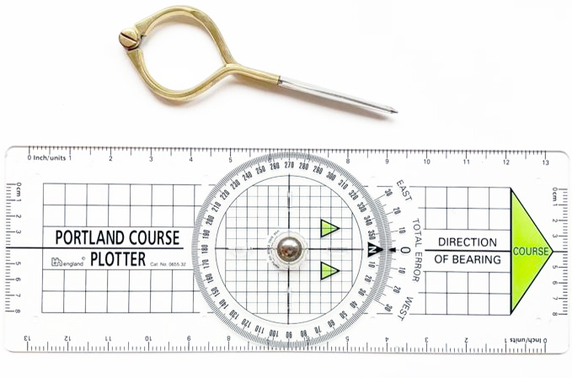
Plotter and divider You’ll need a course plotter and chart-dividers to complete the chartwork exercises - if you don’t already have these you can purchase a top quality set from us for £28 when you place your order.

Delivery UK delivery is free. European delivery is £20, outside Europe delivery is £40.
You can start studying immediately as many of the lessons don’t rely on the printed support materials.
This course is accessed online with no additional software required.
Lessons are accompanied by optional professional narration, and notes.
They are intuitive and easy to follow, whilst more complex subjects are accompanied by interactive animations and graphics to help you gain a full knowledge of each subject in the course syllabus.
Detailed step-by-step workings for navigational or tidal calculations make it easy for you to follow along as we show you how to plot positions, make tidal height and stream calculations, etc
You can go over these again and again, and test your knowledge with regular quizzes throughout each lesson.
At the end of each lesson there is an excercise containg similar questions to the exam, with detailed and illustrated answers sent to you immediately to confirm your progress and fully prepare you for your mock and final exams.
You can repeat entire lessons and excercises as often as you wish until you are confident that you fully understand each subject.
When you have completed the course you can request mock and then final exams.
These are assessed by our RYA Instructors and detailed feedback is provided in any areas that may require further study within the course.
If you pass the final exams you will be awarded the RYA/MCA Coastal Skipper & Yachtmaster Offshore Shorebased Course Certificate , which will be posted to you.
Additional free resits, with suitable Instructor guidance, are available if required.
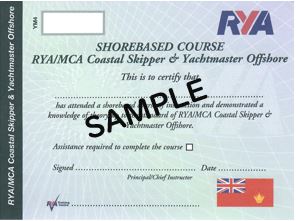
Call us for advice on 0238 218 2604
Course reviews.
Laura Anderson
Very enjoyable and informative
Impressively prompt and thorough feedback on all queries, tests, mock and real exams. Very high standards and you feel you have earned the Yachtmaster certificate.
Ciaran McIntyre
Comprehensive and well delivered
Excellent course materials and high quality delivery. Very responsive and excellent instructor feedback
Andrew Harvey
Excellent Yachtmaster theory course - I’d definitely recommend it.
Does what it says on the tin and more. I was impressed how well the course managed to tackle teaching relatively complex skills in a logical and easy to understand way.
Oliver Fleming
Well put together course.
I found the Yachtmaster theory course to be really well structured and covered all of the syllabus in great detail. I was impressed by how well the course managed to tackle teaching relatively complex skills in a logical and easy to understand way.

Combined - RYA Day Skipper & Yachtmaster to fast track your theory learning
- Certificates of Competence
- RYA Yachtmaster Offshore exam
RYA Yachtmaster Offshore Exam
Full details of the exam syllabus and requirements are shown in the RYA Yachtmaster Scheme Syllabus and Logbook (G158) available from the webshop (see right).
RYA Yachtmaster Offshore practical exams can be taken under sail or power and your certificate will be endorsed accordingly. The candidate or a training centre provides the boat and the RYA provides an examiner. Note: All qualifying sea time and passages must be gained on vessels appropriate to the type of exam i.e. gained in sailing vessels for a sail exam and power vessels for a power exam.
There is no formal training course leading up to the exam, but those who have not previously taken RYA courses often find it useful to book themselves in for some informal training at an RYA centre prior to their exam. This training can be tailor-made to your specific needs and helps to fill any gaps in your knowledge that may become apparent.
The exam will include an assessment of your skippering skills, boat handling, general seamanship, navigation, safety awareness and knowledge of the IRPCS, meteorology and signals.
Boats used for exams
You may use your own boat or a boat that you have chartered or borrowed. You will be responsible for ensuring the boat is seaworthy and suitable for the area in which the exam takes place and equipped as shown below.
The boat used must be between 7m and 18m (LOA) and be in sound, seaworthy condition, equipped to the standard set out in the RYA Boat Safety Handbook 2nd Edition (code G103). The boat must be equipped with a full up to date set of charts and navigational publications along with working instruments and either plotter or GPS. In addition to the candidate there should be two crew on board as the examiner will not take part in the management of the boat during the exam.
There may be vessels that will meet the guidelines outlined above but by virtue of their layout, construction, handling characteristics or other factors may be unsuitable for use for an RYA Yachtmaster Practical examination. The RYA reserves the right to refuse an exam on a vessel that, in the view of the RYA Chief Examiner, will not allow the examiner to conduct an examination to the standard required by the RYA/MCA Yachtmaster Qualification Panel.
Before you book your exam please check that you:
- can provide a boat
- have completed the required mileage and experience as skipper
- hold an SRC (Short Range Certificate) or higher level GMDSS radio operators qualification
- hold a valid first aid certificate
- have read the syllabus in RYA Logbook (G158)
- have read and comply with the pre-requisites above.
Additionally if not on the boat, you will need to bring to the exam:
- laminated or waterproof charts
- GPS set (may be hand held)
- tide tables
- pilotage information for the local area, eg pilot books, port information etc
- plotting instruments.
- Photographic ID card or document, such as a passport or driving licence
If you need your Certificate of Competence in order to work on board a commercial craft subject the MCA's codes of practice, you will need to get it commercially endorsed .
Useful links
Arranging your exam, commercial endorsements, exam payments service, mca manning requirements, professional qualifications.
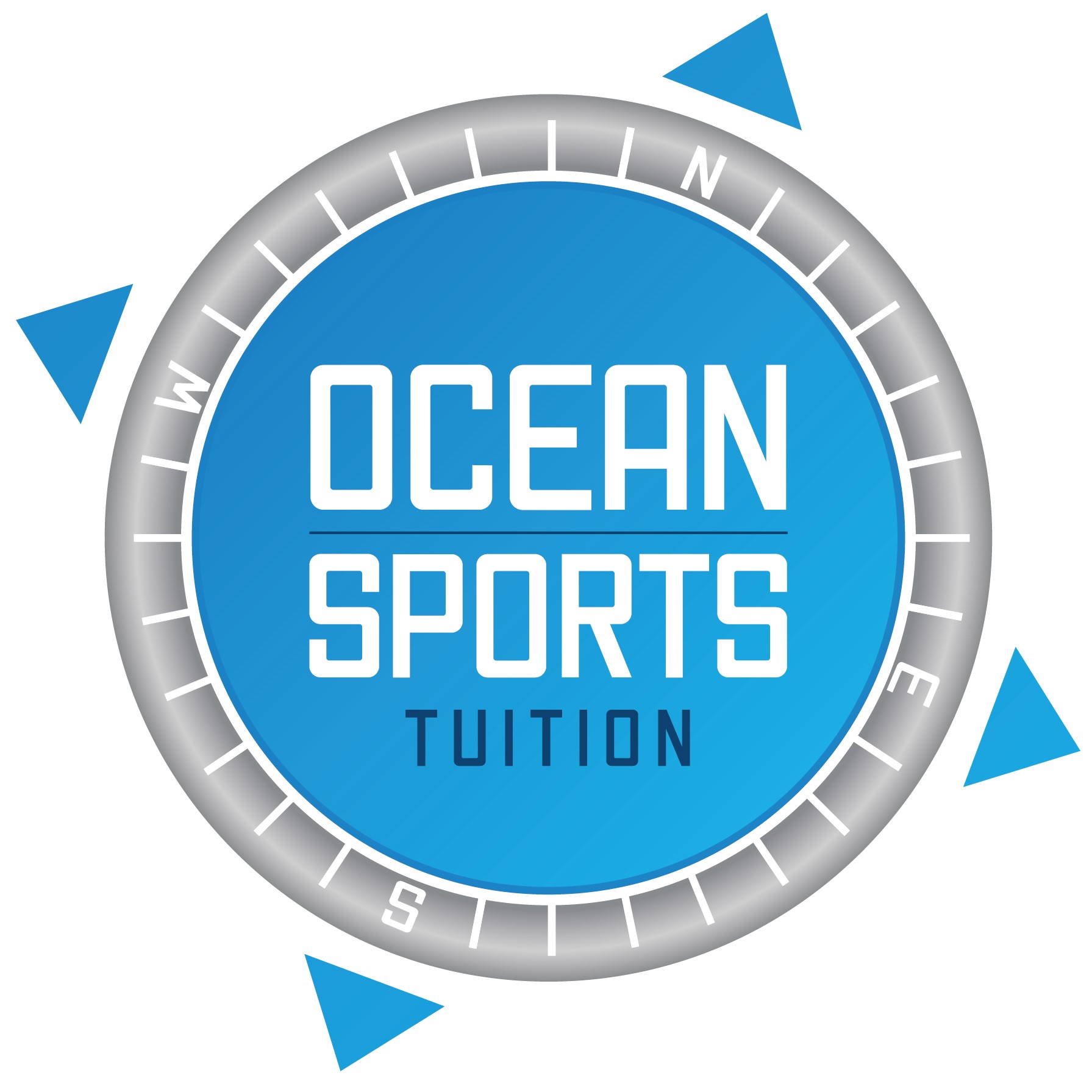
RYA Yachtmaster Motor Practical Prep & Exam - Offshore
Rya yachtmaster motor practical prep & exam in southampton (offshore): course summary.
- Course Duration: 5 days
- Course Location: Saxon Wharf Marina, Southampton, SO14 5QF
- Course Cost: From £1495pp
- Previous Experienced Required: Yes
- Minimum Age Requirement: 18 years old
- What The Course Includes: Tuition, moorings, waterproofs, breakfast, and more!
- What You Will Learn: Practice the finer points of boat handling, planning, navigation and theory, and more. Then Yachtmaster Offshore exam.
The RYA Yachtmaster™ Offshore Certificate of Competence is a highly regarded qualification that is recognised worldwide. RYA Yachtmaster Coastal is a new pathway Certificate of Competency for an Officer in Charge of a Navigational Watch on yachts less than 3000gt.
The RYA Yachtmaster offshore/coastal preparation and exam week consists of intensive revision, as well as expert instruction followed by the Yachtmaster Exam. The exam starts on the Friday, however it may include the weekend depending on the number of students.
WHO IS THIS COURSE FOR?
- Minimum age 18
- Completed the RYA Coastal Skipper/Yachtmaster Theory Course or have equivalent knowledge
Its highly recommended that you also have attended the RYA one day radar course, *RYA sea survival course and RYA diesel engine course.
*required to commercially endorse your RYA MCA certificate.
Yachtmaster coaster skippers will need:
- 30 days on board
- 12 night hours
- Two days as skipper all on vessels under 24m in length
Or if you have completed the RYA Coastal skipper course this is reduced to:
- 20 days on board
- 12 night hours and two days as skipper, all on vessels under 24m in length
- 12 night hours on yachts up to 3000gt
- Two days as skipper on vessels less than 24m.
Yachtmaster offshore candidates will need:
- Minimum of 50 days at sea
- Minimum of 2,500 miles logged
- At least 5 passages over 60 miles measured along the rhumb line from the port of departure to the destination
- At least 5 days experience as a skipper (acting as skipper for at least 2 of these passages including 2 as overnight passages)
A minimum of half the required mileage and passages must be completed in tidal waters and within 10 years of the exam.
Candidates must also hold a valid first aid certificate and GMDSS VHF licence to be eligible to be entered into the exam
WHAT WILL YOU LEARN?
The RYA Yachtmaster Offshore preparation and exam week is an intensive bespoke, focused week of skills and drills putting everything together. You will practice the finer points of boat handling, planning, navigation and theory, as well as crew management and decision making, culminating with the Yachtmaster Offshore exam.
OUTLINE COURSE CONTENT
The RYA Yachtmaster Motor Practical Preparation and Exam consists of 2 stages:
- Monday – Friday AM (9.30AM onwards) is the practical exercises, as well as theory sessions, both day and night.
- Friday PM onwards is the Yachtmaster Offshore Examination.
WHAT DOES THE COURSE COST?
- Monday – Friday AM practical exercises = £1495.00 per person
- Friday PM onwards Yachtmaster Offshore Examination = £241 (paid directly to the RYA, via the exam payment portal ) Yachtmaster Coastal examination fee = 208
WHAT IS INCLUDED IN THE COST?
- Low student instructor ratio
- All moorings
- Expert tuition and guidance after the course
- Onboard accommodation, can be provided £20pp pn
- Waterproofs
- On site parking available
NEXT STEPS AFTER YACHTMASTER MOTOR OFFSHORE
- RYA Cruising Instructor (Motor) Course
Book Your Yachtmaster Motor Practical Prep & Exam Here
Book online below, or call on 023 81 242159 .
If there are no courses listed below, please email us to enquire about availability: [email protected].
We Can Also Help With...
Jet ski club, boat charter, safety boat services.
- RYA Powerboat Level 1 Course
- RYA Powerboat Level 2 Course
- RYA Tender Operator Course
- RYA Intermediate Powerboat Course
- RYA Advanced Powerboat Course
- RYA Powerboat Instructor Course
- RYA Advanced Powerboat Instructor Course
- RYA MCA Advanced Powerboat Prep & Exam
- RYA MCA Commercial Powerboat Skipper Course
- RYA Helmsman Course
- RYA Day Skipper Motor
- RYA Coastal Skipper Motor Course
- MCA Yachtmaster Coastal Certificate of Competence
- MCA Yachtmaster Offshore Certificate of Competence
- RYA / MCA Yachtmaster Academy
- Superyacht Deckhand Course
- RYA PWC Proficiency Course
- PWC Instructor Course
- Own Boat Tuition
- RYA VHF Radio Course
- RYA Sea Survival Course
- RYA First Aid Course
- RYA Essential Seamanship & Navigation Course
- RYA Day Skipper Theory Course
- RYA Coastal Skipper / Yachtmaster Theory Course
- RYA VHF Radio Online Course
- RYA Essential Seamanship & Navigation Online Course
- RYA Day Skipper Theory Online Course
- RYA Coastal Skipper / Yachtmaster Theory Online Course
- RYA CEVNI Assessment Online
- RYA PPR Online Course
- Instructors
- Frequently Asked Questions (FAQs)
- Course Feedback
- Gift Vouchers
- Account icon Log in
- Basic Safety Training
- Refresher (Fire & PST)
- Elementary First Aid
- Fire Prevention & Fire-fighting
- Personal Survival Techniques
- Advanced Fire Fighting
- Advanced Fire Fighting Refresher
- Proficiency in Security Awareness
- Personal Safety & Social Responsibility
- Crowd Management / Crisis Management and Human Behaviour
- Powerboat Level 2
- PWC/Jet Ski License
- PWI/Jet Ski Instructor
- PWC + PWI Pack
- Pack PB2 & PWC
- Day Skipper
- Shorebased Yachtmaster Theory
- Yachtmaster Practical Preparation & Offshore Exam
- Yachtmaster Offshore Package
- Full Deckhand Pack
- Full Interior Pack
- Basic Deckhand Pack
- Basic Interior Pack
- Full Tender and Jet Ski Pack
- Tender Pack
- Jetski Pack
- Yacht Deckhand Training
- Yacht Steward/ess Training
- Basic Food & Beverage Services
- Basic Housekeeping & Laundry Services
- Basic Wine, Bartending & Mixology
- Food Safety Level 2
- ⚡Lithium-ion Battery Safety Awareness on Superyachts
- VHF Short Range Certificate
- RYA Professional Practice & Responsibilities
- RYA Essential Navigation and Seamanship
- RYA Online Coastal Skipper/Yachtmaster Theory
- RYA Online Day Skipper Theory
- STCW PDSD for Superyachts
- STCW PDSD for Cruise Ships
- STCW Proficiency as Ship Security Officer on Superyachts
- Useful Information
- Steward/ess
RYA Yachtmaster Offshore Practical Preparation & RYA Exam
As there are multiple course dates available for this yacht crew training pack, please click the Book Now button and fill out the form with your contact details. We will then get in touch with you to arrange your preferred dates and to take payment over the phone.
Notify me when new dates are available
The RYA Yachtmaster Offshore Practical Preparation course is for the candidates who have already completed the shorebased theory part and want to obtain RYA/MCA Yachtmaster Offshore Certificate of Competence for commercial endorsement to work at sea.
Place: Golfe Juan, France
Duration: 4 days practical preparation + 1 day Exam
Price: 1500 euros + RYA exam fees £260
Candidates for the course must:
1. Be at least 18 years old;
2. Hold RYA Yachtmaster Offshore Theory Certificate
3. Hold a VHF Marine Radio Short Range Certificate
4. Have a valid First Aid certificate (STCW 95 or other recognised certificate; the course must be completed in a classroom; online Elementary First Aid certificates are not accepted)
5. Have sea time: 2,500 NM* (half of it must be in tidal waters, outside of the Mediterranean) including at least five passages over 60 miles acting as a skipper for at least two of these passages; two of the passages must have involved overnight passages, a minimum of 50 days at sea.
6. To obtain your license commercially endorsed, you will need you take your PPR online course .
Full information on the RYA Yachtmaster Offshore Exam PRE-REQUISITES are to be found on the RYA official website: RYA Yachtmaster Offshore exam
The Yachtmaster pre-exam preparation runs over four days with the Offshore exam on the fifth day and night. The course covers all aspects of the Yachtmaster Offshore syllabus including night passaging, engineering, safety equipment and manoeuvres. Our training vessel, a 10m twin screw motor yacht, is RYA coded and located in the Port of Golfe Juan, only 5 minutes walk from our office and classrooms. The RYA Yachtmaster Practical Preparation course is for experienced skippers. We encourage the students to meet our instructor for prior assessment of their eligibility for the course.
Before booking, please make sure you comply with the course pre-requirements. If you would like to discuss this with our Training Manager, please send and email to [email protected]
All our courses are conducted in English. A sufficient level of understanding and speaking is required in order to successfully complete the course. Contact us if you have any questions.
Subscribe to our newsletter & be the first to know of training dates & offers
Checkmark icon Added to your cart:
- Certificates of Competence
RYA Yachtmaster Coastal Exam
Full details of the exam syllabus and requirements are shown in the RYA Yachtmaster Scheme and Logbook (G158) available from the RYA webshop.
RYA Yachtmaster Coastal practical exams can be taken under sail or power and your certificate will be endorsed accordingly. You or a training centre provide the boat and the RYA provides an examiner. Note: All qualifying sea time and passages must be gained on vessels appropriate to the type of exam i.e. gained in sailing vessels for a sail exam and power vessels for a power exam.
The exam will include an assessment of your skippering skills, boat handling, general seamanship, navigation, safety awareness and knowledge of the IRPCS (collision regulations), meteorology and signals. You will be set tasks to demonstrate your ability and may also be asked questions on any part of the syllabus for all practical and shorebased courses up to RYA Yachtmaster Coastal level.
RYA Yachtmaster Coastal exam pre-requisites
Boats used for exams.
You may use your own boat or a boat that you have chartered or borrowed. You will be responsible for ensuring the boat is seaworthy and suitable for the area in which the exam takes place and equipped as shown below.
The boat used must be between 7m and 18m LOA and be in sound, seaworthy condition, equipped to the standard set out in the RYA book Cruising Yacht Safety (code C8). The boat must be equipped with a full up to date set of charts and navigational publications and be efficiently crewed, as the examiner will not take part in the management of the boat during the exam.
Before you book your exam please check that you:
- can provide a boat (either your own or a training centre's boat)
- have completed the required mileage and experience as skipper
- hold an SRC (Short Range Certificate) or higher level GMDSS radio operators qualification
- hold a valid first aid certificate
- have read the syllabus in the RYA Logbook (code G158)
- have read and comply with the pre-requisites above.
Additionally if not on the boat, you will need to bring to the exam:
- laminated or waterproof charts
- GPS set (may be hand held)
- tide tables
- pilotage information for the local area, eg pilot books, port information etc
- plotting instruments.
- Photographic ID card or document, such as a passport or driving licence
If you need your Certificate of Competence in order to work on board a commercial craft subject the MCA's codes of practice, you will need to get it commercially endorsed .
Useful links
Arranging your exam, commercial endorsements, exam payments service, mca manning requirements, professional qualifications.

IMAGES
VIDEO
COMMENTS
Exam time. Switching between Yachtmaster Practical training and starting the exam, with just a couple of hours, was harder than I'd realised. Suddenly, three days of Clive's expert advice was switched off. James explained the exam format, and how he would set us tasks, not give any feedback, just take notes.
RYA Yachtmaster Offshore practical exams can be taken under sail or power and your certificate will be endorsed accordingly. The candidate or a training centre provides the boat and the RYA provides an examiner. Note: All qualifying sea time and passages must be gained on vessels appropriate to the type of exam i.e. gained in sailing vessels ...
RYA Yachtmaster Offshore Practical Exam and pre-course requirements. The practical exam usually takes 8-12 hours for one candidate and 4-9 hours per candidate where more than one person is being examined. Sailors can be asked questions about any part of the RYA syllabus including areas such as: boat handling, navigation, man overboard, safety ...
Yachtmaster Offshore Exam Syllabus. Candidates may be given the opportunity to demonstrate knowledge of competence in the areas listed below. In each section the examiner will expect to see the candidate take full responsibility for the management of the yacht and crew. In Yachtmaster Offshore exams the candidate will be expected to demonstrate ...
The only certificates accepted by the authorities are those issued after an at-sea examination. To become a fully-fledged Yachtmaster, this practical test is the one that counts. Coastal or offshore. In recent years, the old Coastal Skipper has been superseded by the new Yachtmaster Coastal certificate.
For holders of the RYA Coastal Skipper Practical course completion certificate, the seatime requirement is reduced to 400 miles, 2 days living on board, 12 night hours, two days as skipper. ... RYA Yachtmaster Coastal Exam (Sail) The exam will include an assessment of your skippering skills, boat handling, general seamanship, navigation, safety ...
Here we share with you our guide to being totally prepared for your Yacht master practical exam, tips that have come from current Yachtmaster's who have been through what you're about to go through, who've made mistakes, got it right and got it totally wrong. Learn from their successes and mistakes and you'll arrive on exam day feeling ...
To become a fully-fledged Yachtmaster, this practical test is the one that really counts. Yachtmaster Prep. Meteorology matters: a favourite with examiners is to produce a weather map and invite you to analyse it. Be ready and know your subject. This is a non-RYA course and, as such, has no official status or syllabus.
RYA MCA Yachtmaster Coastal and Offshore Certificate of Competence Practical Exam. Getting back on topic this article specifically relates to the two practical exams (Coastal and Offshore), each can be taken onboard a sailing yacht or motor boat.
In order to be eligible to take the Yachtmaster Offshore practical exam, candidates must meet the minimum sea time requirements. The RYA Yachtmaster Offshore minimum sea time prerequisites are as follows: 50 days at sea on yachts up to 500GT; 5 days as skipper on vessels less than 24m LOA; 2500 miles on yachts up to 500GT
The YachtmasterTM Offshore is competent to skipper a cruising yacht on any passage during which the yacht is no more than 150 miles from harbour. Full details of the exam syllabus and requirements are shown in the RYA Yachtmaster Scheme Syllabus and Logbook (G158) available from the webshop (see right). YachtmasterTM Offshore practical exams ...
The full program - RYA Yachtmaster Offshore theory and RYA Yachtmaster Practical - takes 10 days to complete; the exam is usually scheduled right after, and candidates need to allow 2 days for it. With the sea, winds, and weather being unpredictable, to the candidates coming from abroad we advise to add an extra day before taking flights ...
The MPT Yachtmaster Coastal and Offshore Course (#300) is taught on a Motor Yacht and the practical training and examination are towards a Motor Certificate of Competence. (If you are applying for a Sail Endorsement, this course will not satisfy your practical training and exam requirements).
The RYA Yachtmaster online theory course takes your theory knowledge to the standard required for the Yachtmaster Coastal and Yachtmaster Offshore practical exams.. This course advances your skills as a skipper of a yacht or motor boat, with an emphasis on navigation and passage planning for more complex coastal or offshore passages by day and night
RYA Yachtmaster Offshore practical exams can be taken under sail or power and your certificate will be endorsed accordingly. The candidate or a training centre provides the boat and the RYA provides an examiner. Note: All qualifying sea time and passages must be gained on vessels appropriate to the type of exam i.e. gained in sailing vessels ...
The RYA Yachtmaster Motor Practical Preparation and Exam consists of 2 stages: Monday - Friday AM (9.30AM onwards) is the practical exercises, as well as theory sessions, both day and night. Friday PM onwards is the Yachtmaster Offshore Examination.
The RYA Yachtmaster Offshore Practical Preparation course is for the candidates who have already completed the shorebased theory part and want to obtain RYA/MCA Yachtmaster Offshore Certificate of Competence for commercial endorsement to work at sea. ... The Yachtmaster pre-exam preparation runs over four days with the Offshore exam on the ...
The Yachtmaster Online Theory course is the third level of online RYA training available, covering the syllabus for Yachtmaster Coastal and Yachtmaster Offshore theory in a single course. This is advanced training for more experienced sailors, building on the Day Skipper practical and theory courses and equipping you to navigate safely on ...
RYA Yachtmaster Coastal practical exams can be taken under sail or power and your certificate will be endorsed accordingly. You or a training centre provide the boat and the RYA provides an examiner. Note: All qualifying sea time and passages must be gained on vessels appropriate to the type of exam i.e. gained in sailing vessels for a sail ...
Walking tour around Moscow-City.Thanks for watching!MY GEAR THAT I USEMinimalist Handheld SetupiPhone 11 128GB https://amzn.to/3zfqbboMic for Street https://...
There are lots to see in the city centre of Moscow, so we decided to start our series of Russia travel videos by showing you around the most historical part ...
Welcome to the official YouTube channel of the Moscow City Symphony - Russian Philharmonic! https://orchestra.ru
The song is dedicated to the capital city of my beloved country.Translated by Boris AnisimovI have come to say good nightTo the city full of lightsFull of ja...